

How to Write and Deliver a Memorable Graduation Speech: Tips, Examples, and Techniques
- The Speaker Lab
- March 7, 2024
Table of Contents
The goal of any graduation speech is to find words that capture the essence of years spent learning and growing. Today, we’ll guide you through that process and help you craft a memorable graduation speech . You’ll learn to weave gratitude with shared experiences, and balance humor with wisdom. We’ll even help you find quotes that strike a chord and deliver them in a way that resonates.
But that’s not all! Dive into proven strategies for public speaking, managing stage fright, and drawing inspiration from iconic commencement speeches. Discover how personal growth stories add depth to your message and explore themes that leave a lasting impact on your peers as they step forward into new beginnings.
Crafting Your Graduation Speech: A Step-by-Step Guide
When it comes to marking the end of your high school or university journey, a graduation speech can capture the essence of this pivotal moment. But how do you start such an important address?
Opening with Impact
The first words of your graduation speech are crucial. They set the stage for what’s to come and grab your audience’s attention. Think about starting strong by sharing a personal anecdote that ties into the broader experience of your class or drawing from Steve Jobs’ Stanford University commencement speech , where he began with, “Today I want to tell you three stories from my life.” This technique instantly piques interest because it promises narratives that have shaped who you are.
An impactful opening also acknowledges shared experiences. Perhaps you could reflect on how moments in classrooms turned strangers into lifelong friends. Or for university commencements, consider touching upon those late-night study sessions that tested perseverance but ultimately led to academic achievements worth celebrating today.
Building the Body of Your Graduation Speech
In crafting the body content, intertwine lessons learned throughout high school years or during university courses with aspirations for what lies ahead. For instance, share how overcoming obstacles like balancing extracurricular activities and academics taught valuable time management skills.
To add depth, incorporate quotes from luminaries like Oprah Winfrey or draw parallels between classroom learnings and real-world applications. Dive deeper by discussing milestones achieved together as a graduating class and recognizing the hard work everyone put in to make it to this monumental occasion.
Concluding with Inspiration
Your conclusion should leave fellow graduates feeling inspired while helping them celebrate high school memories one last time—or honor those unforgettable college years if addressing higher education grads.
Closing remarks could include heartfelt gratitude towards teachers’ support and parental guidance. You might even crack a joke or two. It’s these personalized touches paired with universal truths that resonate most deeply as students step forward into new chapters post-graduation.
Find Out Exactly How Much You Could Make As a Paid Speaker
Use The Official Speaker Fee Calculator to tell you what you should charge for your first (or next) speaking gig — virtual or in-person!
Delivery Techniques for Confident Speaking
Standing in front of a crowd can turn even the most composed student into a bundle of nerves. But fear not, with some smart strategies, you’ll be able to channel your inner orator and deliver your graduation speech with confidence.
Practicing Your Graduation Speech
Becoming familiar with every word of your speech is key. Rehearse it out loud until the words feel like second nature. This practice does more than just help you remember what comes next; it lets you find the natural rhythm and pace of your delivery. Consider recording yourself to catch any quirks or stumbling blocks—you might be surprised at how much this helps refine your presentation.
A trick often overlooked is practicing in different environments. If possible, stand on the actual stage where you will deliver your commencement address. Familiarity breeds comfort, making that once daunting podium seem like an old friend when graduation day arrives.
Overcoming Nervousness and Stage Fright
Nervousness is normal but doesn’t let it dictate your performance. Before stepping up to speak, take deep breaths to steady yourself—a calm body encourages a calm mind. An effective method for easing anxiety is visualization. Imagine delivering each line perfectly and receiving an enthusiastic response from listeners—envisioning success can make it so.
Maintaining Eye Contact
The power of eye contact cannot be overstated. It connects speaker and listener on a personal level that amplifies engagement significantly. Scan across different sections of the audience periodically without lingering too long on any one individual.
Incorporate these techniques diligently when preparing for the big day. In doing so, they become part of muscle memory and help build confidence. With confidence and plenty of practice on your side, your graduation speech is sure to conclude to applause leaving you to celebrate yet another milestone achieved.
Analyzing Renowned Graduation Speeches for Inspiration
When crafting a commencement speech , it’s often helpful to look at the giants whose words have echoed through auditoriums and across campuses. Steve Jobs’ Stanford University Commencement Speech is a classic example of weaving life lessons into an address that connects deeply with graduates. Similarly, Oprah Winfrey’s Harvard University Commencement Address showed how stumbling blocks can become stepping stones if we learn from them.
Steve Jobs’ Storytelling Mastery
Jobs had a knack for turning personal anecdotes into universal truths. In his Stanford address, he shared three stories from his own life without sounding self-indulgent. These stories worked because each one carried a broader message relevant to every graduate: finding what you love, dealing with loss, and facing death head-on. Jobs famously urged students to “stay hungry, stay foolish,” encouraging them not just to pursue success but remain curious about life despite challenges. This advice is especially poignant for today’s graduating class.
Like Jobs, you too can craft narratives around moments that speak volumes about perseverance and passion.
Oprah’s Unflinching Honesty
Much like her television persona suggests, Oprah did not shy away from discussing her setbacks in front of Harvard’s graduating class. Instead, she confidently laid bare the challenges faced by anyone who dares greatly because failure is part of achieving greatness. As she reminded students, “It doesn’t matter how far you might rise… At some point you are bound to stumble.”
In doing so she forged an instant connection with listeners grappling with their fears about what the future holds post-graduation. It was a powerful reminder that even icons like Oprah are not immune to trials but emerge stronger through them.
The power behind these speeches lies not just in their content but also in their delivery. These speakers mastered the art of speaking confidently before crowds, maintaining eye contact, and conveying authenticity—techniques any speaker should aspire to replicate on graduation day.
Themes and Messages That Resonate with Graduates
Facing a sea of caps and gowns, the right words can turn a graduation ceremony from mundane to memorable. When crafting your commencement speech, focusing on themes like overcoming obstacles and perseverance connects deeply with graduates who have hurdled high school or college challenges.
Overcoming Obstacles
Talking about stumbling blocks is not just relatable; it’s inspirational. Think Steve Jobs at Stanford University or Oprah Winfrey at Harvard—both shared personal tales of setbacks turned into comebacks. Beyond simply telling their stories, they showed how those hurdles were stepping stones to success.
Weave your narrative around the potholes you’ve navigated during your high school years. This doesn’t mean airing every bit of dirty laundry, just highlighting that one significant moment where everything seemed against you yet failed to defeat you.
The Power of Perseverance
Perseverance is more than sticking to something—it’s pushing forward when every fiber wants to quit. It resonates because everyone, including your fellow graduates, has felt that urge to give up but chose to persevere instead.
Incorporate this theme by using vivid examples that mirror collective experiences—the all-nighters before exams or balancing sports stars ambitions with academics—to illustrate perseverance isn’t just an idea but lived reality for many students.
Free Download: 6 Proven Steps to Book More Paid Speaking Gigs in 2024
Download our 18-page guide and start booking more paid speaking gigs today!
Life Lessons Shared During Graduation Speeches
In addition to sharing content that fellow graduates will find relatable and inspirational, you should also consider sharing life lessons with your audience. Whether young or old, everyone has a unique perspective on life and sharing your wisdom can steer graduates toward a fulfilling path.
The Power of Kindness
Making a positive impact doesn’t require grand gestures; sometimes it’s found in small acts of kindness or an innovative idea that simplifies lives. This message sticks because everyone wants their work to mean something—to know they’ve left footprints on society’s vast canvas.
True Grit and Tenacity
Embracing failure and resilience is another powerful theme echoed by commencement speakers across podiums. Let’s face it; not all endeavors lead straight to success. But as Oprah Winfrey once said during her Harvard University commencement address, “It doesn’t matter how far you might rise… At some point, you are bound to stumble.” Her words remind us: How we pick ourselves up matters more than how we fall.
Making a Positive Impact
A graduating class stands poised on tomorrow’s threshold ready to mold history—and speeches should fuel this transformative fire within them. Memorable graduation speeches show individuals that ovation-worthy achievements are possible if you believe your actions count.
As you prepare your graduation speech, consider including one of these life lessons or one of your own. Don’t be afraid to share your hard-won insights to your fellow graduates—you just might inspire them to make history.
Celebrating Achievements and Acknowledging Contributions
Graduation is not just a ceremony. It’s a tribute to the academic achievements and extracurricular activities that have shaped students into who they are. The acknowledgment of teacher support and parental guidance also plays a pivotal role in these speeches, as they’re the scaffolding upon which student successes are built.
Academic Achievements, Extracurricular Activities
Acknowledging academic prowess goes beyond GPA scores or honor societies; it’s about highlighting unique intellectual journeys. Similarly, shining a light on extracurricular triumphs—be it sports stars setting records or artists winning competitions—adds depth to your speech. Remembering these moments isn’t merely recounting victories but celebrating the relentless spirit of your fellow graduates.
Diving deeper into personal anecdotes helps you connect with peers by reminding them of their growth through challenges faced together—from late-night study sessions to championship games. It’s these stories that make graduation memories stick with classmates long after commencement ends.
Teacher Support, Parental Guidance
The unsung heroes behind every graduate deserve their moment in your address too. Teachers’ dedication can turn classrooms into launch pads for dreams, while parents’ unwavering belief often fuels aspirations during tumultuous times like the pandemic.
In weaving tales of mentorship from teachers or wisdom imparted by parents, you remind everyone that success is rarely a solo act—it’s supported by many hands and hearts along the way. Celebrate this collective effort because each person has contributed uniquely to shaping graduating classes across America, including yours.
Common Issues in Writing and Delivering Graduation Speeches
Staring at a blank page as the clock ticks down to graduation day can rattle even the most seasoned speech writers. Overcoming writer’s block is about finding your message stick—the core idea that you want to leave with your peers. Remember, this isn’t just any talk; it’s one that marks a significant transition for both you and your audience.
Overcoming Writer’s Block
Finding yourself stumped on how to write a speech ? Don’t sweat it. Start by jotting down memories from school years or powerful life lessons that resonate. Think of Steve Jobs’ Stanford University commencement speech where he shared personal stories, which became an inspirational backbone for many other speeches.
If inspiration doesn’t strike immediately, step away from the computer. Take a walk and reflect on high school experiences or browse through commencement speeches archives—like Lin-Manuel Miranda’s address at the University of Pennsylvania. They might spark ideas you hadn’t considered yet.
Navigating Technical Troubles
A great speech can stumble over technical hiccups. To avoid glitches, check all equipment beforehand—a simple but crucial task often overlooked due to nerves or excitement about graduating class celebrations.
Prior rehearsals will also let you handle these issues like a pro should they pop up during delivery. Make sure any videos or slides complement rather than overshadow what you’re saying. After all, graduates aren’t there for bells and whistles—they’re there for meaningful words.
Handling Stage Fright
Your knees may shake thinking delivering in front of proud parents and peers—it’s no small feat, after all. Before you step on stage, visual your success until it feels more real and attainable.
And don’t forget to watch your body language. During your speech, maintain eye contact—not stare-downs—to connect genuinely with fellow students. And if anxiety creeps up despite practice sessions? Take deep breaths to steady yourself and keep going. You’ve handled high school—you can handle this.
FAQs on Writing and Delivering a Graduation Speech
What do i say in my graduation speech.
Share heartfelt stories, acknowledge support from others, and inspire your classmates to chase their dreams boldly.
How do you write a 3 minute graduation speech?
Keep it tight: hit the high notes with gratitude, shared memories, a dash of humor, and wrap up with punchy inspiration.
How do I start a graduation speech?
Kick off with thanks. Give props to family and mentors. Set the stage for reflecting on past adventures together.
What is the most important message of a graduation speech?
The core should spark hope—urge peers to leap into tomorrow equipped with lessons learned during these formative years.
Master your moment with a graduation speech that turns heads and warms hearts. Remember the power of gratitude and connect with your audience through stories, those shared adventures that bind you to your classmates. Don’t be afraid to add a few jokes and quotes to your speech either, as well as personal growth stories to inspire.
When you hit the stage, stand tall, make eye contact, and speak from your heart—the podium’s yours. If butterflies invade, breathe deep and know everyone’s rooting for you. Writer’s block didn’t stop you and neither will this.
Your graduation speech is not just words—it’s a battle cry for your graduating class as you prepare to conquer what lies ahead!
- Last Updated: March 5, 2024

Explore Related Resources
Learn How You Could Get Your First (Or Next) Paid Speaking Gig In 90 Days or Less
We receive thousands of applications every day, but we only work with the top 5% of speakers .
Book a call with our team to get started — you’ll learn why the vast majority of our students get a paid speaking gig within 90 days of finishing our program .
If you’re ready to control your schedule, grow your income, and make an impact in the world – it’s time to take the first step. Book a FREE consulting call and let’s get you Booked and Paid to Speak ® .
About The Speaker Lab
We teach speakers how to consistently get booked and paid to speak. Since 2015, we’ve helped thousands of speakers find clarity, confidence, and a clear path to make an impact.
Get Started
Let's connect.
Copyright ©2023 The Speaker Lab. All rights reserved.

Graduation Speech: Complete Guide & Inspiring Graduation Speech Examples
Ready to toss your caps in the air and bid farewell to the hallowed halls of academia?
Not so fast…There’s one final thing left to learn about: graduation speeches!
Sure, they might seem like just another routine part of commencement, but graduation speeches are much more than just a formality.
From tear-jerking tales to laugh-out-loud lessons, the best graduation speeches can be vehicles to share wisdom, life lessons, and unforgettable memories.
Maybe you’re feeling uncertain about how to craft a graduation speech that people actually want to hear… Or wondering what can turn a good one into a great one…Or, simply looking for inspiration on memorable graduation speech examples.
Read on to explore all of the above and more in this comprehensive guide on graduation speeches.
- What is a graduation speech?
- What is the purpose of a graduation speech?
What makes a great graduation speech?
- Steps to Write a Student Graduation Speech [7 Steps]
- Inspiring Graduation Speech Examples [8 Examples]
What is a graduation speech?
First things first: Let’s define what a graduation speech is exactly.
A graduation speech is more than just a ceremonial tradition —it’s a speech that combines a heartfelt send-off, a final farewell, and a celebration of achievement all rolled into one.
These speeches are typically delivered by a selected speaker, such as a notable figure, a faculty member, or a student representative, at the commencement, or graduation ceremony.
But what exactly is the purpose behind these speeches, and why do we place such importance on them?
A graduation speech serves as a symbolic bridge between the academic journey and the adventures that lie ahead. It’s a chance for speakers to reflect on the accomplishments, challenges, and growth experienced by graduates throughout their academic careers. And most importantly, it’s an opportunity to share some wisdom, inspiration, and encouragement as graduates embark on their next chapter.
What is the purpose of a graduation speech?
The purpose of a graduation speech varies depending on the context and the goals of the speaker. But generally, it serves several key purposes:
Let’s break it down:
- Celebrate: Graduation is a big deal, right? So, the speech is a way to celebrate all the hard work and sweat equity that graduates have contributed towards their student experience. And its graduation is a huge achievement worth celebrating!
- Inspire and Motivate: Many graduates feel nervous and apprehensive about what comes next after graduation. As happy as they may be to finally be graduating, many students feel a sense of confusion and discouragement about the future. Graduation speeches are meant to motivate and encourage the graduating class as they wrap up their student experience. It’s all about making them feel inspired as they look towards their future.
- Reflect: Remember all those fun times you had in school? Even the monotonous and routine hustle of being in school will become times you can look back on, joke about, and reminisce on for the rest of your life. Graduation speeches offer a chance to look back on the graduating class memories and once-in-a-lifetime experience.
- Bringing Everyone Together: Graduation is a time for friends, family, and teachers to come together and cheer the graduating class on. The speech helps everyone feel connected and proud of what’s been achieved.
- Closure: Graduation speeches offer closure to the academic journey, providing a symbolic farewell and a sense of completion to graduates as they bid farewell to their alma mater.
- Legacy: Graduation speeches leave a lasting legacy for graduates, offering timeless wisdom, inspiration, and guidance that they can carry with them as they embark on their future endeavors. They serve as a reminder of the values, lessons, and aspirations that define the graduate experience and shape the path forward.
Overall, the purpose of a graduation speech is to leave a lasting impact on the audience, imparting valuable insights, encouragement, and inspiration that resonate long after the ceremony has ended.
Great graduation speeches captivate audiences by weaving together universal themes, inspiring messages, and deep reflection to create a memorable and inspiring experience.
So what makes a graduation speech great ? While every speech is unique in itself, there are some common elements that all great speeches have.
Here are some key elements that contribute to a great graduation speech:
- Authenticity: A great graduation speech is authentic and genuine, reflecting the speaker’s personality, values, and experiences.
- Personal Touch: Incorporating personal anecdotes, stories, and reflections adds depth and emotional resonance to a graduation speech. Sharing personal experiences allows the speaker to connect with the audience and make the speech more engaging.
- Inspiring Message: A great graduation speech delivers an inspiring and uplifting message that motivates graduates to embrace their potential, pursue their passions, and make a difference in the world. The message should be positive, empowering, and filled with hope for the future.
- Relevance: A great graduation speech is relevant to the occasion and the audience, addressing the unique challenges, triumphs, and experiences shared by graduates. It acknowledges the journey they’ve been on and offers guidance as they embark on the next chapter of their lives.
- Clear Structure: A well-structured graduation speech flows smoothly from one point to the next, with a clear beginning, middle, and end.
- Engaging Delivery: A great graduation speech is delivered with passion, energy, and enthusiasm, capturing the attention and interest of the audience from start to finish.
- Humor and Wit: Incorporating humor and wit into a graduation speech can lighten the mood, break the ice, and make the speech more enjoyable for the audience. Humorous anecdotes, clever wordplay, and well-timed jokes can add charm to the speech, making it more entertaining.
- Universal Themes: A great graduation speech explores universal truths that resonate with all graduates, regardless of their background or experiences. It touches on timeless values such as perseverance, resilience, gratitude, and the power of human connection, inspiring graduates to embrace these principles as they navigate life’s challenges.
By incorporating these elements into your own graduation speech, you can create memorable, inspiring, and impactful words that leave a lasting impression on everyone in attendance.
Steps to Write a Student Graduation Speech
Feeling overwhelmed at the thought of writing a graduation speech? That’s normal!
Even for famous and/or notable figures, writing a commencement or graduation speech can be a nerve-wracking experience.
And while writing a commencement speech may seem like a daunting task, breaking it down into basic steps can make the process more manageable and enjoyable.
Here’s a simple guide to help you craft a memorable and inspiring graduation speech:
Step 1: Understand Your Audience
Before you begin writing your speech, take some time to understand your audience. That is, the graduating class, faculty and staff, and family and friends of everyone involved in the ceremony.
Consider the demographics of the graduates, their interests, experiences, and the significance of the occasion.
Tailoring your speech to resonate with the audience will make it more relatable and impactful.
Step 2: Choose a Theme or Message
Every great speech has a central theme or message that ties everything together.
Think about what you want to convey to the graduates—whether it’s words of wisdom, encouragement, or reflections on their journey.
Choose a theme that resonates with the occasion and reflects your personal values and experiences.
Step 3: Brainstorm Ideas and Stories
Once you have a theme in mind, brainstorm ideas, stories, and anecdotes that support your message.
Reflect on your own experiences, lessons learned, and moments of inspiration that you can share with the graduates.
Consider incorporating personal stories, quotes, or examples that illustrate your points and make them more memorable.
Step 4: Create an Outline
Organize your ideas into a clear and coherent outline for your speech.
Start with an introduction that grabs the audience’s attention and introduces your theme. Then, outline the main points you want to cover in the body of the speech. Use supporting stories and examples to illustrate each point.
Finally, conclude your speech with powerful closing remarks that reinforces your message and leaves a lasting impression.
Step 5: Write the Speech
With your outline as a guide, start writing your speech , focusing on clarity, conciseness, and authenticity.
Write in a conversational tone, as if you’re speaking directly to the graduates, and use concise language.
Be sure to include transitions between sections to help the speech flow smoothly and keep the audience engaged.
Step 6: Edit and Revise
Once you’ve written a draft of your speech, take time to edit and revise it for clarity, coherence, and impact.
Cut out any unnecessary or repetitive information, and refine your language to make it more concise and compelling.
Pay attention to pacing, tone, and rhythm, and make sure your speech is well-balanced and engaging from start to finish.
Step 7: Practice, Practice, Practice
Finally, practice delivering your speech aloud multiple times to ensure smooth delivery and confident presentation.
Pay attention to your pacing, timing, hand gestures , and body language, and make adjustments as needed.
Practicing your speech will help you feel more comfortable and confident on the day of the graduation ceremony.
Here are some tips to help you write a memorable speech:
- Share Your Journey: Reflect on your time in school, highlighting challenges you overcame, lessons you learned, and accomplishments you achieved.
- Inspire with Stories: Share inspiring anecdotes or life lessons that have shaped you and can resonate with your peers.
- Express Gratitude: Thank teachers, family, and friends for their support and guidance throughout your academic journey.
- Offer Encouragement: Provide motivation and encouragement to your fellow graduates as they embark on their future endeavors.
By following these basic steps and tips, you can write a graduation speech that is memorable and impactful, leaving a lasting impression on graduates and audience members for years to come.
8 Inspiring Graduation Speech Examples
If you’re looking to get inspired or need some examples to work from, check out some of the most memorable graduation speeches delivered by today’s notable figures.
These speeches showcase how some of the world’s most influential people have delivered impactful messages of change, hard work, success, and life lessons to graduating classes throughout the years.
By incorporating personal stories, motivational quotes, and heartfelt advice, these examples showcase the profound impact a well-crafted speech can have on any audience.
While we’ve only featured eight graduation speech examples here, please note that there are countless other inspiring speeches that you can learn from throughout history. A quick online search will help guide you in the direction of more examples if you don’t find what you’re looking for in this list.
#1 – Steve Jobs’ Stanford University Graduation Speech (2005)
Jobs’s speech is a classic for a reason. He challenged graduates to “stay hungry, stay foolish,” and to never lose sight of their dreams.
#2 – Oprah Winfrey’s Harvard University Graduation Speech (2013)
Oprah Winfrey reflects on her own journey to success, emphasizing the importance of finding purpose, serving others, and remaining true to oneself in the face of adversity.
#3 – Chadwick Boseman’s Howard University Graduation Speech (2018)
The late Chadwick Boseman, shortly before his passing, delivered an inspiring speech about the power of purpose and never giving up on your dreams.
#4 – J.K. Rowling’s Harvard University Graduation Speech (2008)
J.K. Rowling shares insights on the benefits of failure and the importance of imagination, empathy, and resilience in overcoming life’s challenges and achieving success.
#5 – Michelle Obama’s CCNY Graduation Speech (2016)
Michelle Obama reflects on the power of education and the importance of resilience, determination, and hope in overcoming obstacles and achieving one’s dreams.
#6 – David Foster Wallace’s Kenyon College Graduation Speech (2005)
David Foster Wallace’s speech, titled “This is Water,” is a profound meditation on mindfulness and empathy. Wallace delivers a thought-provoking speech about the value of mindfulness, empathy, and perspective in leading a meaningful and fulfilling life.
#7 – Satya Nadella’s University of Chicago Graduation Speech (2018)
The CEO of Microsoft spoke about the future of technology and the need for human-centered innovation. Nadella shares insights on the role of empathy, curiosity, and continuous learning in driving innovation and success in today’s rapidly changing world.
#8 – Ken Burns’ Stanford University Graduation Speech (2016)
The documentarian urged graduates to be curious, to challenge themselves, and to fight for what they believe in.
Learn From Graduation Speech Examples From Notable Figures
As we’ve seen from speeches like the ones listed above, throughout history, famous individuals have delivered impactful speeches that resonate with audiences and offer valuable lessons for graduates.
So how do these notable figures inspire through their speeches?
- Emphasizing Change: Notable figures often highlight the importance of embracing change and adapting to new beginnings in their speeches.
- Hard Work and Success: Through personal anecdotes, they stress the significance of hard work and determination in achieving success.
- Life Lessons: Graduation speeches by renowned figures are filled with insightful life lessons that guide and motivate graduates on their journey ahead.
- Words of Encouragement: Notable graduation speeches give encouragement, confidence, and hope to the audience as they move ahead.
Throughout this guide, we’ve explored how these speeches are more than just a routine part of commencement—they’re opportunities to share wisdom, life lessons, and unforgettable memories.
Whether you were feeling uncertain about crafting a speech that resonates or curious about the secrets behind turning a good speech into a great one, we’ve covered it all.
As you step onto the stage to deliver your graduation speech, remember the power you hold. Inspire, uplift, and connect us all!
Here’s to making your mark and leaving a lasting impression as you embark on the next chapter of your journey!
Whether you’re giving a graduation speech or a TEDx talk, this free guide will help expand your reach.

Check out more great articles from the Thought-Leader Blog covering TEDx Talks, success mindsets, and everything else in between
How to Get a TED Talk
How to prepare a ted talk, how to market yourself effectively, how to become a keynote speaker, how to speak professionally.
This writer analyzed 100 graduation speeches — here are the 4 tips they all share
Share this idea.
- Click to share on Facebook (Opens in new window)
- Click to share on Twitter (Opens in new window)
- Click to share on LinkedIn (Opens in new window)
- Click to share on Reddit (Opens in new window)
- Click to share on Pocket (Opens in new window)
- Click to share on WhatsApp (Opens in new window)

Steve Jobs has been credited over the years with popularizing any number of other people’s inventions, from the personal computer to the tablet to the mobile phone. But none of these gifts may be as enduring as one of his rarely credited contributions to contemporary life — popularizing the viral commencement address.
On June 12, 2005, Jobs stood before the graduating class of Stanford University and reminded them that he had never graduated from college. “Truth be told, this is the closest I’ve ever gotten to a college graduation.” He then told three stories about his life. “That’s it. No big deal. Just three stories.”
That speech , coinciding as it did with the rise of internet virality (the first TED Talk would be posted on TED.com exactly 12 months later; the iPhone was introduced exactly 12 months after that), launched a global obsession with pithy, inspirational talks. Jobs’s speech has since been viewed more than 40 million times on YouTube.
Graduation speeches, long viewed as the burdensome interruption before diplomas were granted and mortar boards were tossed, have since become big business. Kurt Vonnegut, Ann Patchett, Carl Hiaasen, J.K. Rowling, Mary Karr, David Foster Wallace and many others have all had their commencement speeches published as books.
I’ve been fortunate to give a handful of commencement addresses over the years, and I confess to a fascination with the genre. The internet has been a boon this hobby. There are thousands of commencement speeches on the web. Can we learn anything from their messages?
I’ve spent the last few years gathering and coding hundreds of life stories, looking for patterns and takeaways that could help all of us live with more meaning, purpose and joy. I decided to put some of my coding tools to work, analyzing 100 of the most popular recent commencement speeches.
Here are the four tips they all contain:
1. Dream big
“I think it is often easier to make progress on mega-ambitious dreams. I know that sounds completely nuts. But, since no one else is crazy enough to do it, you have little competition. There are so few people this crazy that I feel like I know them all by first name. They all travel as if they are pack dogs and stick to each other like glue. The best people want to work the big challenges.” — Larry Page at University of Michigan , 2009
“We don’t beat the reaper by living longer. We beat the reaper by living well and living fully. For the reaper is always going to come for all of us. The question is: What do we do between the time we are born, and the time he shows up? Because when he shows up, it’s too late to do all the things that you’re always gonna, kinda get around to.” — Randy Pausch at Carnegie Mellon University , 2009
“Graduates, we need you. We need you to run companies and make decisions about who has access to capital. We need you to serve at the highest levels of government and determine our country’s standing in the world. We need you to work in our hospitals and in our courtrooms and in our schools. We need you to shape the future of technology. We need you because your perspective — the sum total of your intellect and your lived experience — will make our country stronger.” — Kamala Harris at Tennessee State University , 2022
2. Work hard
“Your work is going to fill a large part of your life, and the only way to be truly satisfied is to do what you believe is great work. And the only way to do great work is to love what you do. If you haven’t found it yet, keep looking. Don’t settle. As with all matters of the heart, you’ll know when you find it.” — Steve Jobs at Stanford University , 2005
“I just directed my first film. I was completely unprepared, but my own ignorance to my own limitations looked like confidence and got me into the director’s chair. Once there, I had to figure it all out, and my belief that I could handle these things, contrary to all evidence of my ability to do so was half the battle. The other half was very hard work. The experience was the deepest and most meaningful one of my career.” — Natalie Portman at Harvard University , 2015
“When you’re doing the work you’re meant to do, it feels right and every day is a bonus, regardless of what you’re getting paid … But make it your life’s work to remake the world because there is nothing more beautiful or more worthwhile than working to leave something better for humanity.” — Oprah Winfrey at Stanford University , 2008
3. Make mistakes
”Fail big. That’s right. Fail big … It’s a new world out there, and it’s a mean world out there, and you only live once. So do what you feel passionate about. Take chances, professionally. Don’t be afraid to fail. There’s an old IQ test with nine dots, and you had to draw five lines with a pencil within these nine dots without lifting the pencil, and the only way to do it was to go outside the box. So don’t be afraid to go outside the box.” — Denzel Washington at University of Pennsylvania , 2011
“The world doesn’t care how many times you fall down, as long as it’s one fewer than the number of times you get back up.” — Aaron Sorkin at Syracuse University , 2013
“My experience has been that my mistakes led to the best thing in my life. Being embarrassed when you mess up is part of the human experience of getting back up dusting yourself off and seeing who still wants to hang out with you afterward and laugh about it. That’s a gift. The times I was told no or wasn’t included wasn’t chosen, didn’t win, didn’t make the cut, looking back it really feels like those moments we’re as important if not more crucial than the moments I was told yes.” — Taylor Swift at NYU , 2022
“Work hard, be kind, and amazing things will happen.” — Conan O’Brien at Dartmouth College , 2011
“Empathy and kindness are the true signs of emotional intelligence.” — Will Ferrell at the University of Southern California , 2017
“So here’s something I know to be true, although it’s a little corny, and I don’t quite know what to do with it: What I regret most in my life are failures of kindness. Those moments when another human being was there, in front of me, suffering, and I responded … sensibly. Reservedly. Mildly. Or, to look at it from the other end of the telescope: Who, in your life, do you remember most fondly, with the most undeniable feelings of warmth? Those who were kindest to you, I bet. It’s a little facile, maybe, and certainly hard to implement, but I’d say, as a goal in life, you could do worse than: Try to be kinder.” — George Saunders at Syracuse University , 2013
So what can we learn from these themes?
Every era in American life has its own standards of what it means to be a success. Shortly after America’s founding, success was all about character. Led by Benjamin Franklin, Americans embraced virtue, industry, and frugality. In the twentieth century, success was all about personality. Led by Dale Carnegie, Americans embraced salesmanship, reinvention and charisma. Today, led by Steve Jobs, Americans are embracing meaning, authenticity and bliss. Or, as Kermit the Frog put it in a 1996 commencement speech at Southampton College , “May success and a smile always be yours … even when you’re knee-deep in the sticky muck of life.”
Dream, work, fail and smile are as good a foursome of American identity today as I know. And if those ideas don’t inspire you, you can always embrace the far more practical advice erroneously attributed to Kurt Vonnegut in a commencement speech that he never gave at MIT, but was instead delivered by Chicago Tribune columnist Mary Schmich in an imaginary speech to graduates she published in an old-fashioned newspaper, “Ladies and gentlemen of the class of ’97: Wear sunscreen.”
This post was adapted from one published on his newsletter The Nonlinear Life; go here to subscribe.
Watch his TEDxIEMadrid Talk now:
About the author
Bruce Feiler is the author of seven New York Times bestsellers, including The Secrets of Happy Families and Council of Dads, both of which became the subject of TED Talks. His latest book, Life Is in the Transitions: Mastering Change at Any Age, from which this post and TEDx Talk are adapted, describes his journey across America, collecting hundreds of life stories, exploring how we can navigate life’s growing number of transitions with more meaning, purpose and joy. To learn more, visit brucefeiler.com, follow him on Twitter (@brucefeiler), or sign up for his newsletter The Nonlinear Life.
- bruce feiler
- communication
- inspiration
- society and culture
- surprise me
TED Talk of the Day

How to make radical climate action the new normal

6 ways to give that aren't about money

A smart way to handle anxiety -- courtesy of soccer great Lionel Messi

How do top athletes get into the zone? By getting uncomfortable

6 things people do around the world to slow down

Creating a contract -- yes, a contract! -- could help you get what you want from your relationship

Could your life story use an update? Here’s how to do it

6 tips to help you be a better human now

How to have better conversations on social media (really!)

3 strategies for effective leadership, from a former astronaut

7 things everyone should do while they're in college that can help them in the future

5 pieces of essential life advice from seniors

The two kinds of stories we tell about ourselves

What older Americans can teach us about the fight for Civil Rights
BOSTON, JUNE 25-26 PUBLIC SPEAKING CLASS IS ALMOST FULL! RESERVE YOUR SPOT NOW

- Public Speaking Classes
- Corporate Presentation Training
- Online Public Speaking Course
- Northeast Region
- Midwest Region
- Southeast Region
- Central Region
- Western Region
- Presentation Skills
- 101 Public Speaking Tips
- Fear of Public Speaking
How to Write a Graduation Speech (Graduation Speech Examples)

Have you been asked to deliver a commencement speech? Or have you worked your butt off to become valedictorian or salutatorian, and now you have to deliver a graduation speech? In this post, we will cover one of the more challenging types of presentation creation: How to Write a Graduation Speech . (By the way, I have also included a few popular graduation speech examples as a guide for you.)
This post is a continuation of our How to Create a Presentation series. We are going to break this post down into three parts, though. We will show you how to create a commencement speech in this post. Next week, I’ll show you how to write a valedictorian speech and how to deliver a salutatorian speech. Each of these graduation speeches has a slightly different purpose, but all of them need to be inspirational and funny.
How to Write a Commencement Speech
The commencement speech is often the keynote speech of the graduation ceremony. This presentation should be uplifting and entertaining, but this graduation speech should also teach a life lesson to the graduating students. If you do a search on YouTube of the best graduation speeches, many of these speakers will be famous comedians. When a comedian delivers a commencement speech, and the speech is posted on YouTube, it will always get a ton of views. The humor alone will make people want to watch the video. Three of the most popular of these speeches are by Conan O’Brien, Will Ferrell, and Ellen DeGeneres. The interesting thing about the speeches from these famous comedians is that, yes, they are funny, but the inspiration comes from what they learned from their failures.
“There is no such thing as failure. Failure is just life life trying to push you in another direction.” Oprah Winfrey, Harvard University Commencement Speech
A Good Structure When You Write a Commencement Address
Thank the crowd.

Start with Something Funny

Be Inspirational
The inspirational part of your commencement speech will come from the theme of the graduation speech . (For Sample Graduation Speech Themes , see the section below.) The easiest way to develop a theme is to look for an inspirational famous quote about success. You can do this by just going to Google and type in “success quotes”. Once you come up with a great quote, you can either paraphrase the quote and make it your own or quote the original speaker.

Tell Stories from Your Own Experience Related to Your Quote (Theme).
This the most important part of how to write a graduation speech. The stories and examples are what the audience will remember. These stories add emotion and inspiration to your graduation speech. They also help you build rapport with the audience. Finally, these stories make your delivery much easier. You don’t have to memorize a lot of material. Instead, just play the video in your head of what happened and describe the incident to the graduates.
For a great example of this, watch the YouTube video on Stanford University’s channel where Steve Jobs gives the commencement speech. I love this speech, because Jobs skips the introduction and the funny stuff and starts his speech with the following. “I’m going to tell you three stories.” It’s simple, and the crowd loves him.
End with an Inspirational Call to Action.

So as you go on to the next stage in your life and you experience failure… because you will experience failure, use that as a stepping stone to your next success. Persevere. Don’t rest on that success. Use it as a stepping stone to your next success. Persevere, and you will experience a series of successes and failures that will allow you to accomplish something great!”
Use this outline to create a simple 20 to 30 minute speech. (The shorter the better… No one gets a diploma until you finish.)
Sample Graduation Speech Themes

If you are having trouble coming up with a theme for your graduation speech, here are a few Sample Commencement Speech Themes. As you read through them, think about which them or quote has been most applicable in your career? Once you choose a graduation speech them, use the outline above to create your speech.
- Hard Work Leads to Success
“I find that the harder I work, the more luck I seem to have.” — Coleman Cox
- Create Your Own Path.
“It is better to fail in originality than to succeed in imitation.” — Herman Melville
- Make Things Happen.
“Success usually comes to those who are too busy to be looking for it.” — Henry David Thoreau
- Don’t Settle for Average. Strive for Greatness.
“Don’t be afraid to give up the good to go for the great.” –John D. Rockefeller
- Don’t Wait for the Perfect Opportunity. Look for a Way to Create Your Own Opportunity.
“Opportunities don’t happen. You create them.” — Chris Grosser/blockquote> The Road Ahead is Hard, But It Leads to Success. “Successful people do what unsuccessful people are not willing to do. Don’t wish it were easier; wish you were better.” — Jim Rohn
- Focus on Your Dream.
“The successful warrior is the average man, with laser-like focus.” — Bruce Lee
- Learn from Every Mistake to Move Toward Success.
“Success seems to be connected with action. Successful people keep moving. They make mistakes, but they don’t quit.” — Conrad Hilton
- When Your Why is Big Enough, Your How Will Appear.
“If you really want to do something, you’ll find a way. If you don’t, you’ll find an excuse.” — Jim Rohn
- Happiness is the Key to Success.
“Success is not the key to happiness. Happiness is the key to success. If you love what you are doing, you will be successful.” — Albert Schweitzer
Use the Speech Creator as a Guide to How to Create a Graduation Speech
Once you have chosen a them, and you have a few stories to inspire your audience, use our Online Speech Writer to help you organize your thoughts. (It’s free.)

Free Public Speaking Tips , Podcasts
View More Posts By Category: Free Public Speaking Tips | leadership tips | Online Courses | Past Fearless Presentations ® Classes | Podcasts | presentation skills | Uncategorized
Greetings Island ideas
How To Write A Graduation Speech: 12 Practical Tips

Around 2 million bachelor’s degrees are given out every year, but only a handful of students are chosen to give a graduation speech. It’s a wonderful honor that allows you to make a lasting impression before your classmates start the next chapter of their lives. Everyone will be there to hear you speak, including friends, family, and faculty.
It’s a lot of responsibility, so it’s only natural that you might be feeling a bit nervous and unsure of where to begin. But fear not! There’s a lot you can do to be ready.
Create a stunning party invitation in minutes
Customize and share your invitation with our easy-to-use editor!

Read on for 12 tips to write, prepare and deliver a memorable graduation speech.
Tip #1: read inspirational quotes.
Reading inspirational quotes is a great way to start brainstorming graduation speech ideas. The best quotes can pack a whole speech into only a sentence or two.
Here are a few examples to get the fire of inspiration started:
“The two most important days in your life are the day you are born and the day you find out why.” – Mark Twain
“Life is like riding a bicycle. To keep your balance you must keep moving.” – Albert Einstein
“If you are free, you need to free somebody else. If you have some power, then your job is to empower somebody else.” – Toni Morrison
“Youth is happy because it has the ability to see beauty. Anyone who keeps the ability to see beauty never grows old.” – Franz Kafka
If there are a couple of quotes that truly mean a lot to you, then it’s okay to use them in your speech, but in the long run you should rely mostly on your own words and feelings.

Tip #2: Listen to and Watch Famous Speeches
There is a lot you can learn from listening to and watching famous speeches .
When listening to just the audio of a speech, you can focus on how the speaker uses dramatic pauses and passionate tones to keep their audience’s ears perked up. You’ll also notice that the speaker pronounces words slowly enough so that everything is clear, rather than mumbled.
As you watch a speech, pay attention to how a speaker moves their hands for emphasis instead of gripping the podium for dear life. Facial expressions are also important. A speaker shouldn’t look bored or sleepy, so try smiling and raising your eyebrows from time to time.
Lucky for you, there are plenty of amazing speeches out there to learn from. For example, Martin Luther King Jr.’s “I have a dream” speech about equal rights is one of the most famous speeches of all time. Watch it and find out why.
You can also watch actual graduation speech examples that went viral on the internet because of their truthful messages and sincere delivery.
Tip #3: Reflect on the Past
An important element of a graduation speech is the past, whether distant or recent. Which experiences did you learn from? What has shaped you as a person up until now? Reflect on them.
You can focus on an important moment from your childhood if necessary, but be sure to include notable stories or lessons you learned during your time in school.
This is also a great opportunity to talk about people who inspired and helped you along the way. For example, who was your best teacher and why? What did they teach you?
Almost anyone can give sage advice, but without your personal stories to springboard from, your advice will go into one ear and out the other.
Think of some examples and explore them through writing. Not everything will go into the final version of your speech, but for the time being you should simply search for those stories that reveal shareable pearls of wisdom.
Tip #4: Think About the Future
An equally important aspect of any graduation speech is the future, including its promises and potential pitfalls. Now that you and your classmates are graduating, the future is in the forefront of everyone’s mind.
Think about what exactly you want to do with your life, how you’re going to do it, and why. Of course, you don’t want to focus on your future exclusively. Make sure you zoom out and talk about broad ideas and insights that can be applied to your class or generation.
For example, what common problems, personal or global, will the future hold? What can one do about it? This is a good chance to talk about working together as a community, country, or as one race.
Whether you’re explaining the struggle of depression or the crisis of climate change, it’s crucial to end on a hopeful note. With your speech, you can help guide people forward into the next step of their lives and beyond.
Tip #5: Decide on a Theme or Message
By now, you’ve probably written hundreds of different academic papers. No matter what their topic, though, they all had one thing in common: a thesis. Like any other paper you’ve written for school, your speech should have something similar to a thesis as well.
In other words, your speech will need a theme or message that can keep your audience’s attention focused. The more you ramble, the less likely they’ll pay attention or remember what you say afterward.
A speech can have more than one message, but it’s best to keep it to less than four main messages.
One example is actress Natalie Portman’s graduation speech which focused on fighting against self-doubt and pursuing your passions.
Here are some other ideas for graduation speech themes:
- The benefits of failure
- The importance of imagination
- Embracing the unknown
- Finding your passion
- Facing your fears
- Keeping in touch with your inner child
Tip #6: Start with a Hook, End with a Quote
You only have one chance to grab your audience’s attention, and that’s at the very beginning of your speech. Once you lose them, chances are you won’t get their attention back, so it’s crucial to begin your speech with a hook.
A quote, whether it’s from a book, movie, or elsewhere, is a common way of capturing people’s attention at the beginning of a speech, but there are other ways to hook them too.
Another way is to tell a brief but interesting story that reflects the themes of your speech. Opening with a question or related statistic that you plan on illuminating for the next quarter of an hour or so is yet another way to keep people focused and interested.
Everyone loves a good joke, which is why preparing one is a great way to not only open up your speech, but break the ice too.
While you should start with a hook, you should end with a quote. It can be a quote from someone else, or better yet, it can be a quote from you. Think of a way to summarize your message into a pithy, final statement. If your audience walks away with only the one quote in their heads, they will still receive a valuable insight or piece of advice.
Tip #7: Write Multiple Drafts
The first draft is usually the most daunting because you’re starting with a blank page, but afterward you have something to work with, so it should be less stressful. As you write the first draft, don’t second guess yourself. Rather, let the ideas and words flow as freely as possible.
Once you have your first draft, step away from it for a day or so, then come back to it with a fresh pair of eyes. If you’re like most people, you read in your head, but when editing, it’s a good habit to read sentences out loud to make sure they flow well and sound natural.
While you edit, reword cliché phrases, such as “since the beginning of time” or “the calm before the storm.”
Beware of waffling too. What’s waffling? It’s when you use too many words or sentences to talk about something when it could be phrased more simply and concisely.
As you go through each draft, you’ll want to keep an eye out for any typos. Once you feel really confident in the draft of your speech, send it to a few trusted friends who can provide you with constructive criticism.

Tip #8: Send Out Graduation Announcements Ahead of Time
You’ll want as many friends and family members there for your big day as possible, so you should send out graduation announcements fairly early. It’s typical to give a notice of at least two weeks, if not more.
Be sure to include the date, location, and time of the event. But why stop there? Most online cards are customizable, so feel free to include a professional picture that shows your confidence and sense of accomplishment.
Encourage your friends and family to make their excitement viral by adding a graduation hashtag to your announcement.
If you plan on having a graduation party, which you most definitely should, make sure you send the invitations out in a timely manner too and be sure to use some of these great graduation party ideas .
For those who are not invited to the ceremony, you can send graduation announcements after the event when you get a chance. Usually within a month is acceptable.
Tip #9: Practice in Front of a Mirror and with a Few Loved Ones
Practicing in front of a mirror allows you to be aware of your facial expressions and body movements. As you speak, emphasize with your voice, face, and arms where it feels necessary and natural.
Having a few loved ones around to practice your speech with has multiple benefits. For one, you can get feedback from them on both your performance and the speech itself. A miniature audience also gives you the chance to get comfortable with making friendly eye contact as you speak. However, it should be relatively brief eye contact, so don’t focus on just one person during your actual speech.
Time yourself as you speak to determine how long it takes to give the whole speech. On average, a graduation speech is about 10-20 minutes long. It should be as concise as possible without sacrificing the content or quality. The right length is something of a balancing act, but with enough practice reading your speech, you’ll develop a feel for what parts may drag on and what parts may need to be expanded.
An additional bonus that comes from repeated practicing is that you’ll be able to memorize more of your speech. After all, it’s better to face the audience as much as possible rather than look down at your notes.
Tip #10: Dress to Feel Confident and Comfortable
It might seem like confidence and comfort are mutually exclusive, but there are certain items you can wear to both look and feel great.
You’ll be doing a lot of standing and walking, so when it comes to women’s clothing, limit heels to 2 inches or wear some fashionable flats. Long skirts are ideal because they don’t restrict your movement and you won’t have to worry about any wardrobe malfunctions. Avoid thin straps or strapless tops by wearing a conservative yet elegant blouse.
Once you have an outfit picked out, test it by wearing it for a day to see how it feels.
For men’s clothing, you can wear dress shoes with gel inserts. There are lots of dress pants with flexible material. It feels like you’re wearing comfy pajamas when in fact you look ready to trade some stocks. There are also button-ups with stretchy material too. It’s best to try these items on in the store to make sure they fit perfectly.
Another option is to choose clothes made from a breathable material, such as cotton.
A neck tie is often notorious for being uncomfortable, but it looks quite snazzy. As a compromise, don’t put the tie on too tightly. If your shirt fits well, the tie should too. On the other hand, clip-on ties are not only comfortable, but also convenient. As long as the clip-on is of high quality, it should look genuine.
If you have an outfit that looks great but doesn’t quite fit right, consider getting it tailored to perfection by a local seamstress.

Tip #11: Keep Your Nerves in Check
Say “eleven benevolent elephants” five times fast. Chances are it didn’t come out exactly as you intended.
You’re not a machine, you’re human. You might make a mistake or two during your speech, such as mixing up words or mispronouncing them altogether. That’s totally okay! Don’t dwell on it, just shake it off and start over from where the slip-up occurred.
Take advantage of psychology and feel more confident by striking a power pose beforehand. Go into a bathroom or another private area and stand with your feet wide apart as you lift your arms outward and upward for about a minute.
You should also remember that feeling nervous is perfectly natural. Worrying about being nervous can make you even more nervous. Accept that you’ll feel some degree of anxiety and take a few deep breaths to reduce it as much as possible. Remember that pauses feel a lot longer in your mind, so most people won’t notice you taking a moment to catch your breath during your speech.
Tip #12: Be Yourself
Even though researching speeches comes with a lot of benefits, you should remember that everyone is an individual with their own habits and style. It’s normal to feel pressured when you have to prepare such an important speech. When you look for inspiration, you may be tempted to try and mimic these idols.
While it’s important to learn from such great speakers, you should only take from them the skills that work for you and adapt them to your own habits and style.
You weren’t chosen to give a graduation speech because you’re Abraham Lincoln or Malala Yousafzai. You were chosen for the simple reason that you’re you. If you’re known for being funny, then go ahead and tell a couple of jokes. If you’re the sentimental type, feel free to let loose a few tears.
You’re much more likely to give a memorable speech if you stay true to yourself and your beliefs.
Are You Ready to Send Out Your Graduation Announcements?
Now that you know how to go about giving a memorable graduation speech, you should be ready to send out your announcements and grad party invites .
For the price of nothing, Greetings Island has an amazing variety of artistic announcements and invitations to let everyone know about your upcoming big day. They are easily customizable so you include all your information in an awesome presentation that fits your tastes. The perfect design is a mere click away!
After the festivities, you can also send lovely graduation thank you cards to show your gratitude to your friends and family.
Once you’ve customized your announcements, you can easily print them at home or at a professional print shop. Keeping things virtual? We have additional options, such as sending them through email with RSVP services or downloading them as high-res images that you can share on social media networks.

Related Posts

22 Creative Preschool Graduation Themes to Celebrate Your Little Ones

How To Write Graduation Announcements: 30 Wording Ideas

Proven Family Reunion Planning Ideas for a Dazzling Event
- EXPLORE Random Article
How to Deliver a Graduation Speech
Last Updated: January 22, 2024 Approved
This article was co-authored by Patrick Muñoz . Patrick is an internationally recognized Voice & Speech Coach, focusing on public speaking, vocal power, accent and dialects, accent reduction, voiceover, acting and speech therapy. He has worked with clients such as Penelope Cruz, Eva Longoria, and Roselyn Sanchez. He was voted LA's Favorite Voice and Dialect Coach by BACKSTAGE, is the voice and speech coach for Disney and Turner Classic Movies, and is a member of Voice and Speech Trainers Association. There are 8 references cited in this article, which can be found at the bottom of the page. wikiHow marks an article as reader-approved once it receives enough positive feedback. This article received 13 testimonials and 83% of readers who voted found it helpful, earning it our reader-approved status. This article has been viewed 1,004,048 times.
If you've earned the prestigious honor of delivering the class graduation speech, that means you'll be the voice of your graduating class. It's a huge responsibility, but also a great fortune. To deliver a graduation speech, work on writing something both memorable and meaningful, practice beforehand, memorize the bulk of your speech but give yourself clear notes, use engaging body language, and speak at a slow yet natural pace. The truth is that when you've written an awesome graduation speech, delivering it in front of your peers, parents, and teachers is an experience that you'll never forget -- and hopefully, neither will they.
Sample Speeches

Writing Your Graduation Speech

- How have I changed since I started this level of school? How might other classmates have changed since they started?
- What is the most important lesson I can take away from my time in school?
- What are some success stories that happened during your time in school?
- What are some of the challenges we face in the next leg of our journey, and how are we better prepared to overcome those challenges now that we're here?

- Adversity . Adversity is the challenges that you as a group overcame in order to get where you are now. Maybe one of your classmates got diagnosed with cancer, and taught the rest of the class how to fight, not just a disease like cancer, but any obstacles that come your way. This is adversity.
- Maturity . An especially good theme for high school students, maturity is about becoming an adult and taking responsibility. Perhaps you can talk about how young and green most Freshman were when you started, and how Seniors now have grown into shining examples of people who are adults, not because they need to be, but because they want to be.
- Life lessons . School is a microcosm for life. That's a fancy way of saying that school helps teach people about life in general. School teaches you that hard work pays off, that there's more to learning than memorizing equations, that what you do outside the classroom is just as important as what you do inside, and that the friends you make are the glue that keeps you together.

- Consider using the burger method . The top bun is your introduction; the patty is your ideas in paragraph form; and the bottom bun is your conclusion. Use a lot of ketchup, mayonnaise, and other condiments: They are your jokes, but remember that too much mayonnaise can ruin an otherwise good burger. [4] X Research source

- "I remember when we all filed into this room four years ago. We looked young, like we had just walked out of bed. And while all of us now look older, I see that most of us still look as sleepy as we did on that fateful day."
- " I don't want to alarm you, but the class of 20— has a serious problem. It's not a financial problem. It's not an intellectual problem. It's an attitude problem. The class of 20— has a problem being awesome."

- Make it interesting by saying something unexpected. If you're talking about facing adversity, everyone expects you to talk about tests, dating/relationships, and time management. Why not talk about something unexpected? Talk about how grades aren't always a sign that you have learned, maybe, or about how hard it is to let teachers let their guard down. Surprise your audience in novel ways.
- Make sure your theme is never far away. Ask yourself: How does this paragraph relate back to my theme? If it doesn't relate, ask yourself why it's there.

- "In conclusion, high school has taught us that the grades that we earn aren't as important as the education that we receive. We earn a grade for taking a History test. We get an education for understanding why slavery is immoral. We earn a grade for taking a math test. We get an education for understanding that mathematical models can help us fly. We earn a grade for writing an English essay. We get an education for understanding that words are poems and poems are beautiful."
- "When I think of our class, I don't think of any one person, I think of a community of workers, a family. A community has a certain responsibility, and as of yet, we have never forgotten that responsibility. As we walk off into the wider world today, let us not forget the responsibility that we carry both as members of this community, and as citizens of the world.
Delivering Your Graduation Speech

- Listen to a speech by Martin Luther King, Jr., one of the most effective public speakers ever, and pay attention to how slowly he speaks. [9] X Research source Slow speeches sound really good because they let the audience process what is being said.
- Practice delivering your speech into a voice recorder and listen to the recording. You'll see that even when you think you're speaking slowly, it comes out a lot quicker than you imagine. There's always an opportunity to slow down.

- Scan the audience every once in a while. If you're reading your speech, you'll obviously spend a lot of time looking at your paper. When you finish a sentence, however, look up from the dais and scan the people in the audience. This will help you catch your breath.
- Don't be afraid of focusing on one person for a short while. It's not uncommon for a speaker to lock eyes with a person in the audience for two, three, or four seconds. (Four seconds is a really long time when you're alone on a podium!) Don't do it all the time, but try to do it every once in a while.

- If you're getting nervous, try out the old public speaking trick of imagining someone in the audience being naked. Don't fixate on it, but imagine it. It will help rake away some of the butterflies and allow you to concentrate on delivering a more confident speech.

- It will get you in the habit of what works in the speech and what doesn't. There's still time to change that joke that no one understands, or focus more on that part that your friends really like.
- It will help you memorize the speech, making you less nervous and giving you better presence.
Expert Q&A

- Always give credit to your teachers. Thanks Helpful 0 Not Helpful 0
- Talk natural, it may seem like you half to be all formal but chances are your speech will be more meaningful if it seems like it's coming from you. Thanks Helpful 0 Not Helpful 0
- Do not plagiarize a speech from the Internet. You will get in trouble and be punished. Thanks Helpful 23 Not Helpful 3
You Might Also Like

- ↑ Patrick Muñoz. Voice & Speech Coach. Expert Interview. 12 November 2019.
- ↑ https://www.npr.org/sections/ed/2014/05/19/311861694/what-we-learned-from-the-best-commencement-speeches-ever
- ↑ https://tacomacc.libguides.com/c.php?g=373176&p=2523552
- ↑ https://www.ypo.org/2015/04/7-memorable-ways-to-open-a-speech-or-presentation/
- ↑ http://www.myspeechclass.com/conclude.html
- ↑ https://www.quantifiedcommunications.com/blog/martin-luther-king-i-have-a-dream
- ↑ https://speakandconquer.com/how-to-give-a-speech-without-crying/
- Make a Farewell Speech
About this article

To deliver a graduation speech, start by coming up with a theme for your speech, like growing up or overcoming adversity. Then, begin your speech with a catchy introduction that will grab your audience's attention, like an interesting story or a joke about your school. Next, for the middle of your speech, try to tie things back to your theme and surprise your audience to keep them interested. Finally, for the end of your speech, come back to the theme of your speech and tell your audience what they can learn from it. To learn how to deliver your speech once you're up on stage, scroll down! Did this summary help you? Yes No
Reader Success Stories
May 19, 2017
Did this article help you?
May 3, 2017
Aug 28, 2016
Mark Sagayno
Mar 28, 2016
Emmanuel Duwah
May 28, 2017

- About wikiHow
- Terms of Use
- Privacy Policy
- Do Not Sell or Share My Info
- Not Selling Info
My Speech Class
Public Speaking Tips & Speech Topics
How to Write a High School Graduation Speech (+ Examples)

Amanda Green was born in a small town in the west of Scotland, where everyone knows everyone. I joined the Toastmasters 15 years ago, and I served in nearly every office in the club since then. I love helping others gain confidence and skills they can apply in every day life.
I was in several clubs in high school, I was the valedictorian, and I happened to be the youngest in our graduating class. Needless to say, I had to write and give more than one speech at our graduation.
Being asked to give a graduation speech in high school is a tremendous honor and responsibility. It takes a lot of preparation, from planning to writing and editing your speech.
My guide should show you how to write a graduation speech for high school, especially with the examples I’ve included. Follow the template and tips, and you’re sure to receive a standing ovation from your audience.
How Long Is a High School Graduation Speech?

The best high school graduation speeches aren’t long and boring since the ceremonies already take hours. Aim for an address that doesn’t exceed 10 minutes. Keep your audience’s attention and save some for other people’s speeches.
Your graduation speech should only be around 500 to 600 words. You have to read it slowly and articulate the words clearly. One way to keep it shorter is by removing cliches and other unnecessary content.
High School Graduation Speech Template
Essays and speeches usually have three parts: introduction, body, and conclusion. Here is a structure you can follow for a memorable high school graduation speech.
Introduction
- Thank people for attending. Acknowledge the presence of your teachers, parents, and fellow graduates.
- Introduce yourself. Not everyone in the room knows you, even if you’re the class valedictorian.
- Catch the audience’s attention by sharing a motivational quote or saying. Your personal narratives and advice will later be based on this saying.
- Recall memorable high school experiences. Anything is worth sharing, whether it’s a simple day in class or your debate competition.
- Encourage classmates not to forget these beautiful memories.
- Share helpful advice for this new chapter of their lives.
- Restate the quote or saying you mentioned in the introduction.
- End with a call to action that will encourage the graduates to make a difference.
- Thank the audience for hearing you out.
How to Write a Graduation Speech for High School

Public speaking takes a lot of preparation. Here are some tips you should follow when writing and delivering a graduation speech for high school.
Can We Write Your Speech?
Get your audience blown away with help from a professional speechwriter. Free proofreading and copy-editing included.
Pick a Theme
Inspirational high school graduation speeches leave a mark on people. If you want to create one, try building it around a central message.
Think about everything you experienced in high school and look for patterns. Was high school about learning from mistakes? Or was it about achieving big dreams with small steps? Consider not only what is essential to you but also what is important for your fellow graduates.
Once you have picked a theme, selecting a quote, including advice, and recalling high school memories will be much easier. Here are some popular themes you can consider using for yours, but make sure to choose ones that are relevant to you and/or your class.
- Embracing failure
- Big things take time
- Achieving big dreams with small steps
- Facing change with grace
- Overcoming adversity
- Becoming a lifelong learner
- Being more intentional and responsible for your future
Begin With Gratitude and a Self-Introduction
Once you step on stage, you must start with a few formalities. Know the name of the previous speakers and acknowledge their excellent speeches. Then, thank everyone in attendance, including the teachers, parents, and fellow students.
Say it’s a privilege to speak before the audience on this special day. This is also the best time to introduce yourself.
Don’t assume that everyone in the room knows who you are. State your name and why you were tasked to create the speech. Below is an example.
“Thank you, Mr. Jones, for the wonderful speech. And thank you to the parents, teachers, staff, and fellow graduates in this room who have made the past four years unforgettable. It’s a pleasure to stand in front of everyone and represent the class of 2022 at this address. I am [name], your class valedictorian.”
Make It About Everybody But You
Your graduation speech is not a mini-biography of your accomplishments. Only sprinkle a few personal anecdotes, then include what the four years of high school have been like for the other students. Below is an example.
“Four years ago, we were freshmen walking through the doors of [school name]. While some of us want to be doctors, artists, engineers, and singers in the future, we all had one goal in mind during that time: to leave a mark on the school in the next four years.”
Recall High School Memories
Tap the ceremony’s nostalgia by recalling important events from the past four years. You can include prom, school fairs, and even mundane scenarios. Include hardships, such as the sudden shift to online classes during the pandemic.
If you are a valedictorian , you should know which memories everyone treasures. Try interviewing some of your peers about their best high school memories. Below is an example.
“Every batch of graduates from [school] has a common core memory. For us, it was probably prom 2022. Instead of getting our beauty sleep the night before the dance, everyone stayed in school until 8 PM because of the last-minute changes. While that experience was full of pressure and chaos, we look back on that memory remembering teamwork and dedication.”
Share Advice
Your advice is the most crucial part of the speech. It serves as a call to action the students will follow in the future.
Make sure to keep it positive and remind everyone that anything is possible. You can also advise them to advocate for others and treat everyone equally.
Here’s an example showing what I mean.
“The future is uncertain, and the only thing we can do is be optimistic about it. We learned to stay determined in the past four years, so we can do it again throughout college or our careers.”
Incorporate Your Personality
Just because you’re speaking for the rest of the class and following an outline doesn’t mean your speech should be boring. You can still infuse your personality through humor, anecdotes , and life experiences.
You can also open your address with something funny, as long as it’s appropriate and timely. If you’re a valedictorian, self-deprecating humor will be a hit. Try adding quirky memories from classes that will immerse your audience.
Leave Your Audience Inspired
You are not at the graduation to merely receive your diploma. As a speaker, you need to leave your audience inspired on the next chapter of their lives. Encourage them to find their purpose and make a difference in the world.
Some speakers end their speeches with another quote. Here is the one I used in my high school speech, but there are tons to be found on the internet you can use that might better suit your needs.
- “All our dreams can come true… if we have the courage to pursue them.” — Walt Disney
Finally, thank everyone for taking the time to listen to your speech. Express gratitude toward your classmates for the memories over the last four years.
Proofread Your Work
Read your writing out loud and fix parts that don’t sound pleasing. Doing so will make your writing more powerful and precise. Look out for flowery language, excessive adjectives, and lengthy sentences.
When editing, make sure to remove cliches from your writing. These are words and phrases that have been overused in speech and writing. These include phrases like “all walks of life,” “if it ain’t broke, don’t fix it,” and “two wrongs don’t make a right.”
Try sharing more personal anecdotes and collective memories than tired pieces of advice. This will make the speech more interesting and customized for the audience. Find out what your fellow high school graduates and the rest of the audience want to hear and know, then write it concisely and effectively.
Once you’re done fixing clarity issues, it’s time to fix structural errors. Perform several edits on your speech to remove all spelling and grammar mistakes.
Practice Your High School Graduation Speech
There’s no exact formula for the perfect valedictorian or commencement speech. But if you follow my tips and examples and speak from the heart, your fellow graduates will live by your words as they go about their futures.
Remember to keep your engaging speech positive and inspiring. Recall memories from high school, then make them look forward to creating new ones in their careers or college.
Informative Essay Outline – Ultimate Guide & Examples
Mother of the Groom Speech – Best Tips & Examples
Leave a Comment
I accept the Privacy Policy
Reach out to us for sponsorship opportunities
Vivamus integer non suscipit taciti mus etiam at primis tempor sagittis euismod libero facilisi.
© 2024 My Speech Class
- Our Writers
- How to Order
- Assignment Writing Service
- Report Writing Service
- Buy Coursework
- Dissertation Writing Service
- Research Paper Writing Service
- All Essay Services
- Buy Research Paper
- Buy Term Paper
- Buy Dissertation
- Buy Case study
- Buy Presentation
- Buy Personal statement
Speech Writing
Graduation Speech
Crafting the Perfect Graduation Speech: A Guide with Examples
10 min read
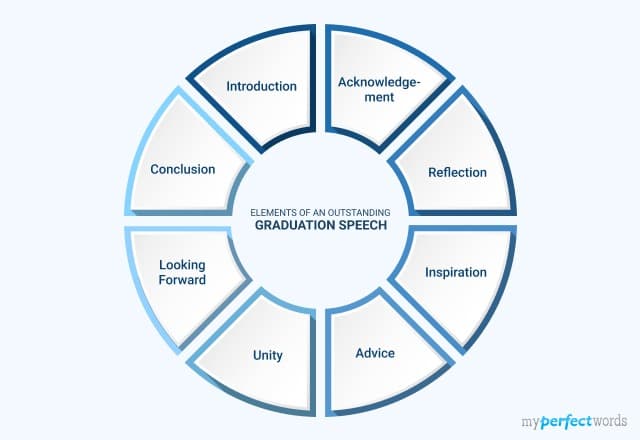
People also read
The 10 Key Steps for Perfect Speech Writing
Understanding Speech Format - Simple Steps for Outlining
How to Start A Speech - 13 Interesting Ideas & Examples
20+ Outstanding Speech Examples for Your Help
Common Types of Speeches that Every Speechwriter Should Know
Good Impromptu Speech Topics for Students
Entertaining Speech Topics for Your Next Debate
Understanding Special Occasion Speech: Types, Steps, Examples and Tips
Introduction Speech - A Step-by-Step Guide & Examples
How to Write the Best Acceptance Speech for Your Audience?
Presentation Speech - An Ultimate Writing Guide
Commemorative Speech - Writing Guide, Outline & Examples
Farewell Speech - Writing Tips & Examples
How to Write an Extemporaneous Speech? A Step-by-Step Guide
Have you ever stood at the threshold of a new journey, feeling a mix of excitement and uncertainty?
Well, if you're a soon-to-be graduate, that's probably exactly how you're feeling right now.
The big day is coming, and you're wondering, 'How will I write my speech? Can I ask for speech writing help?
Don’t worry!
In this blog, we're going to tell you how to write a graduation speech for students. Get ready to discover the secrets of crafting a graduation speech that not only captures your audience's attention but also leaves a profound impact on your fellow graduates.
Let's transform that uncertainty into inspiration and confidence as we delve into the art of delivering a speech that will make your graduation day truly unforgettable.

Paper Due? Why Suffer? That's our Job!
- 1. What is a Graduation Speech?
- 2. How to Write a Graduation Speech?
- 3. Graduation Speeches From Notable Figures
- 4. Graduation Speech Examples for Students
- 5. Graduation Speech Ideas - 2024
- 6. Graduation Speech Writing Tips
What is a Graduation Speech?
A graduation speech is the heart of your big day, bringing together all your experiences and achievements.
It's more than just talking – it's a way to inspire and celebrate. It's not just a tradition. This type of speech is a chance to share what you've learned and dream about the future.
Your graduation speech should include everyone – your friends, the tough times you all faced, and the good times you shared.
Elements of Graduation Speech
Creating a memorable graduation speech involves several key elements that can help you connect with your audience and make a lasting impression.
Here are the crucial elements you should consider:
|
|
| Start with a compelling opening. Use a quote, anecdote, or question. |
| Express gratitude to teachers, parents, and peers for their support. |
| Reflect on school experiences and share impactful stories. |
| Offer words of encouragement and motivation for the future. |
| Share practical life lessons related to goals, challenges, and positivity. |
| Emphasize the importance of shared experiences and friendships. |
| Discuss hopes and dreams for the exciting possibilities ahead. |
| Wrap up with a memorable and inspiring closing message. |
All these elements make a strong and memorable speech and help make your graduation successful.
How to Write a Graduation Speech?
Writing an inspirational graduation speech that stands out isn't as daunting as it may seem.
With a structured approach and a dash of creativity, you can deliver the best special occasion speech that leaves a lasting impact on your audience.
Here's a step-by-step guide on how to start a graduation speech and create an inspiring address:
Begin with a Memorable Opening
Start with an attention-grabbing quote, a personal anecdote, or a thought-provoking question.
This sets the tone for your speech and captures your audience's interest right from the beginning.
Express Gratitude
Show appreciation to your teachers, parents, and fellow students.
Express how their support and contributions have been instrumental in your academic journey. This sets a positive and grateful tone for your speech.
Reflect on Meaningful Moments
Share personal stories and school experiences that have had a significant impact on your life and the lives of your classmates.
Use these anecdotes to connect with your audience emotionally.
Offer Words of Inspiration
Provide words of inspiration and motivation. Encourage your fellow graduates to embrace the future with confidence and courage.
Use stories or quotes to illustrate your points.
Share Practical Advice
Share life lessons and any advice you've learned during your academic journey.
Offer insights related to pursuing goals, overcoming challenges, and maintaining a positive outlook on life.
Emphasize Unity and Shared Experiences
Highlight the importance of unity and the bonds formed with your classmates.
Emphasize the strength of collective experiences and friendships that have been a significant part of your school life.
Discuss Hopes and Dreams
Talk about your hopes and dreams for the future, both for yourself and your fellow graduates. Paint a vivid picture of the exciting possibilities that lie ahead.
End with an Inspiring Conclusion
Conclude your speech with a memorable message that resonates with your audience.
Leave them with a lasting impression or a call to action that inspires them to take on the future with enthusiasm.
Graduation Speeches From Notable Figures
Notable figures, from celebrities to accomplished professionals, often deliver inspiring graduation speeches, sharing their wisdom, experiences, and advice with the graduates.
In this section, we explore some remarkable graduation speeches that have left a lasting impact on audiences worldwide.
Taylor Swift Graduation Speech
Taylor Swift, the renowned singer-songwriter, delivered an inspiring graduation speech that emphasized embracing change and authenticity.
Her words have motivated graduates worldwide, making her speech a source of valuable life lessons.
“The times I was told no or wasn’t included, wasn’t chosen, didn’t win, didn’t make the cut…looking back, it really feels like those moments were as important, if not more crucial, than the moments I was told ‘yes.’ …”
Watch complete graduation speech here:
Rory Gilmore Graduation Speech
Rory Gilmore, a beloved fictional character from the TV series "Gilmore Girls," delivered a heartwarming graduation speech that celebrated the value of hard work, ambition, and the pursuit of dreams.
Her speech remains an iconic moment in the series and a testament to the power of perseverance and ambition.
Watch her graduation speech here:
Ree Drummond - Oklahoma State University
Ree Drummond, known as "The Pioneer Woman," shared her insights and wisdom in a graduation speech delivered in 2022.
Her address offers a unique perspective on life, success, and the pursuit of dreams, making it a valuable resource for graduates seeking inspiration and guidance as they set out on their own paths.
Listen to the complete speech in this video:
Steve Jobs - 2005
Steve Jobs' iconic 2005 commencement speech at Stanford University delivered invaluable life lessons and inspiration.
His words continue to resonate with graduates and individuals worldwide, offering timeless guidance on pursuing one's passions and creating a meaningful life.
Check out his complete speech in this video:
Graduation Speech Examples for Students
Looking for inspiration for your own graduation speech? Here is a short graduation speech:
Ladies and gentlemen, faculty, parents, and, of course, my fellow graduates, Today, we stand on the cusp of an exciting new chapter. Our time here has been filled with challenges and triumphs, laughter and tears, and countless memories we will carry with us. As we move forward, let's remember the lessons we've learned, the friendships we've made, and the potential we hold. Let's embrace the future with open hearts and open minds. Our journey has just begun, and the world is waiting for us to make our mark. I have no doubt that each one of us has the power to shape a brighter tomorrow. So, let's march forward, together, and create a future that we can all be proud of. Congratulations, Class of [Year]! Our adventure begins now! Thank you. |
Read some more diverse graduation speech samples to spark your creativity:
Graduation Speech for Kindergarten - Example
Short Graduation Speech
Graduation Speech for Kids
Graduation Speech For Primary 6
8th Grade Graduation Speech
High School Graduation Speech
Explore a collection of inspiring graduation speeches, each offering a unique perspective on this momentous occasion.
Graduation Speech by Students - Example
Graduation Speech for Parents - Example
Graduation Speech by Teacher - Example
Graduation Speech by Principal- Example
Graduation Speech Thanking Teachers
Graduation Speech Ideas - 2024
Here are some interesting and fun graduation speech ideas.
- Talk about a current school event.
- Try something new like poetry or metaphors to make your speech interesting.
- Tell a story about your class, for example, ‘what was the driving force of the class of 2021?’
- Use quotes from famous and classic books.
- Use lyrics from the class anthem.
- Be inspirational and share an inspirational story.
- Share a humorous experience.
- Convey a memorable message.
- If appropriate, add a song with meaning.
- Appreciate a fellow classmate or a teacher.
- Connect your speech with your 1st day at school.
- Significant events that took place in the school.
- A professor that made you fall in love with a major subject.
- The long time you spent in the school library and how it impacted your interactions with other students.
- Tell me about who inspired you the most in your life.
Graduation Speech Writing Tips
Crafting a memorable graduation speech can be a rewarding yet challenging task. Here are some essential tips to help you write an impactful and engaging speech for your big day:
- Know Your Audience: Understanding your audience is crucial to tailor your speech effectively.
- Start Strong: An attention-grabbing beginning sets the tone for your speech.
- Tell Personal Stories: Personal anecdotes and experiences create a meaningful connection.
- Inspire and Motivate: Your speech should encourage confidence about the future.
- Share Practical Advice: Offering practical life advice adds value to your speech.
- Embrace Humor: Appropriately used humor can engage your audience.
- Be Concise: Keeping your speech at an appropriate length is essential to maintain interest.
- Practice and Rehearse: Preparation ensures confidence in your delivery.
- End on a High Note: A memorable conclusion leaves a lasting impression.
As you take that first step forward, congratulations on your graduation, and we wish you the best of luck in whatever comes next. We hope this graduation speech guide has given you some pointers for what to say in your speech.
If you need further help, you can avail of our assistance and get your speech before the big day.
At MyPerfectWords.com , one of the best essay writing service for college , we help new graduates make their day memorable by delivering quality speeches.
Buy speech from us and get ready to shine.

Write Essay Within 60 Seconds!

Dr. Barbara is a highly experienced writer and author who holds a Ph.D. degree in public health from an Ivy League school. She has worked in the medical field for many years, conducting extensive research on various health topics. Her writing has been featured in several top-tier publications.

Paper Due? Why Suffer? That’s our Job!
Keep reading

- Associate Degrees
- BACHELOR DEGREES
- MASTER DEGREE
- DOCTORAL DEGREES
- GRADUATION BLOG
- STUDY TOOLS


Table of Contents
How to write a graduation speech .
Writing a graduation speech can be daunting. It’s natural to want to give the best speech possible to commemorate such an important milestone in your life. But How to write a graduation speech that is worthy of the day?
This page will be a comprehensive step-by-step guide for how to write a graduation speech that inspires and motivates. It will walk you through everything you need to know, how to write a graduation speech that leaves your audience teary-eyed.
At the end of this page, I have written a sample graduation speech using this guide.
I have spent days asking how to write the perfect graduation speech. I remember the banging of my head on my desk in frustration when I was preparing for my graduation speech. The reason for this paranoia was that I too, just like everyone else, wanted to give the best speech possible to commemorate such an important milestone of my life.
The amount of time and energy I had spent in preparation for my graduation speech prompted me to put up this page.
So here it is:
LET’S UNPACK with the No. 1 problem in How to write a graduation speech?
The number 1 problem which everyone faces when setting out to write a graduation speech is where to start?
Well naturally before you start preparing your speech you will need to know what you want to talk about. You can call this a theme, a topic, an idea, or the subject of your speech. At this stage, it can be a one-liner or even a word that describes what you want to talk about.
Again I know it is easier said than done. That’s why I have listed some approaches to help you figure out the topic of your graduation speech.
There are different approaches you can go by, but I will write a few which helped me.
How to find the subject of your graduation speech?
How to write a graduation speech around your core beliefs..
The first place I will recommend you to look for inspiration is your core beliefs. If you very strongly believe in something then talk about it. This could be what you stand for. Or what you will always stand for? Or what do you advocate? Maybe these beliefs are human rights protection, prevention of female objectification, and child labor, or maybe you believe in socialism or the importance of family structure.
The idea behind talking about your core beliefs is that you are genuinely passionate about them, and you will most likely have enough to talk about them.
How to write a graduation speech based on Timeline.
I like to call this a timeline-based approach in deciding what to talk about during your graduation speech. Evident by the name you will pick up a moment or time and will talk about that time and how great or challenging that period was in your life.
You can pick a period from your past to describe a challenge or a beauty of it and how it impacted your life and what lesson it has for others as well.
You can pick a goal in the future which you want to accomplish and what motivates you in selecting this goal and how it will impact your life or people at large.
To help you better understand, I have listed some examples. These examples sound generic but the actual events which happened to you will be unique for your audience.
For the past based graduation speech, some ideas are:
• A problem you faced to get to this position
• You had a certain difficulty, but you didn’t give up
• You faced trauma but still, you graduated or accomplished a goal.
• What drove you, who motivated you, who built your passion, who never lost hope in you, who built your character and gave you confidence?
• What was your journey to get to this point?
• What took you to get here?
• What were your expectations?
Remember: The purpose is not to tell your biography or how great you are. The purpose is to inspire with the underlying qualities which kept you going.
If you don’t want your speech to be sentimental you can always talk about:
• How fun your experience was
• How you will miss partying
• How greatly have you lived your life here
• How amazing your friends, teachers, and institute were.
• How helpful everyone’s contribution was in your graduation.
• You can go with funny events or can make very light fun at the expense of the audience. (Never insult.)
• How has this time here changed you into a better person?
• How do you overcome your shortfalls
These are some past-based graduation theme approaches. Similarly, you can decide to talk about the future:
• Your goals
• Your optimism and how you plan to change the world.
• You always dream to follow your passion, and now you are one step closer
• You have an ideal personality who inspired you; now you can follow the lead.
• How you will miss this time, place, and people.
• How you have learned to dream big and now explore
• No one is perfect, how you make mistakes, you will keep making mistakes, but this place taught you how to learn lessons from mistakes.
• You look forward to stepping into the world.
• How guest of honor is your ideal and why do you appreciate them and want to follow the lead?
These are some of the examples I call a time-based approach in deciding how to write your graduation speech.
Note: you don’t have to pick only one. You can relate a past event to achieve a future goal.
How to write a graduation speech based on characteristics of value.
This one is simple really. When I was deciding how to write my graduation speech I came across this approach. In this approach of deciding your graduation speech theme, you can pick a characteristic and talk about it. In this case, you pick a characteristic value, and you start building your thoughts around it.
• Value of Truth
• Importance of love
• Need of Courage
• Humbleness in sacrifice
• Lessons in failures
• Struggle for passion
• Never giving up
How to write a graduation speech on the beauty of your passion.
Here you find anything you are good at. It doesn’t have to be some sophisticated idea or any well-praised concept. It can be anything you are good at.
It could be:
• Any creative idea
• Participation in social causes
• Spirituality
• Gardening
Maybe you are passionate about gaming, or you have an interest in building stuff, or you like to experiment, or you have a sense of empathy and want to participate in social causes, or you have a knack for health and well-being.
The point is it could be anything you like to do, which gives you happiness or a sense of fulfillment. You have to find out the good sides of this passion and talk about it. Link your source of happiness to real-world scenarios.
I mean there is a legendary speech about making a bed every day and how this one task is so great.
How to write a graduation speech on delivering a point or argument.
The last approach I would recommend is delivering a point approach. Here you decide an end goal of your speech first then you build your argument around that goal. You have seen something wrong, or you would like some practice to change. Or in your view, a certain thing is not value-added but time-consuming or a method is not creative but laborious, and you would like it to change.
You get the idea of what I am talking about. You may want to talk about human rights, and freedom of speech, you want to sound an alarm and talk about the environment, or you want to talk about any other modern-day problem.
Here you have a point which you want to make. You will build your speech around that point. For example, you believe that home assignments are a waste of time.
These are some approaches you can use to decide what you want to talk about. You can be creative and mix them or stick to one area.
Now that you have your main idea, let’s start planning your graduation speech.
The planning stage of how to write a graduation speech.
Before you start writing your graduation speech there are some factors you need to know and understand when you are planning to write your graduation speech. We will figure those out during the planning process of the graduation speech together.
Time and place
What time is your speech.
The first thing you need to know is which day, and where you will be delivering your speech. Usually the place of your graduation ceremony. It may be on campus grounds or in any other venue.
But you need to know the time in a different context as well.
Here you formally need to know at least three times for your graduation speech. Write that down for your reference.
• First: Obviously what time is the speech?
• Second: how much time is allotted to your speech?
• Third: how much time do you have until your speech?
How much time is allotted to you?
You need to know how much time is allotted to your speech. You need to know that to prepare your speech. You need to know to create enough material to cover that time slot. Not too short, not too long.
My rule of thumb is at the planning stage when you are writing a rough draft for your speech your draft should have enough material to cover at least double the allotted time. You will need to consult with the organizers or graduation committee about how much time is allocated to you?
How long should a graduation speech be?
Ideally, a graduation speech should be between 5 and 7 minutes long. That’s just enough time to deliver some inspiring words without dragging on (or putting your audience to sleep!).
Of course, each situation is different. If you’re the valedictorian or salutatorian, you may have a little more time to speak. And if you’re speaking at a smaller graduation ceremony, your speech may be shorter.
No matter how long your speech is, make sure you spend some time thinking about what you want to say. A well-written and well-delivered speech can be a memorable way to end your time as a student and start your new chapter as a graduate!
How much time do you have to prepare for your graduation speech?
The third and most important one is to know how much time you have for planning. You know this by allocating your time to your daily most important tasks.
Know the Audience
This is tricky and an important factor to know before you write your graduation speech. Audiences come in all shapes and sizes. Know your audience before you start talking so that they feel welcome at the ceremony. You need to know who you will be addressing during your graduation speech.
The common attendees are:
• Graduates
• Top students
• Faculty
• And special guests
But keep in mind that among the audience all these people can also be
• Media Personalities
• Influencers
• Potential employers
• Govt. officials
• Ethnic or minority groups
Beware of those who are attending, You don’t want to sound insensitive or hurt someone or a group of people’s feelings. For example, with a religious audience, you don’t want to talk against religion. Or might want to omit any jokes about physical features, or people with disability conditions if you have the same people in your audience.
The second important thing to know about your audience is that you do not want to be specific to a small group of people. People of all ages and beliefs can be there, so avoid making specific cultural references to target only a small group of people. Instead, talk in broad general terms.
There could be potential employers among the audience. You don’t want to sound cocky or to be remembered as arrogant. I mean it is entirely possible that a month later you are attending an interview and find out that the interviewer knows you already from your graduation speech with a bad impression.
Tone when delivering your graduation speech.
This is important to know and decide. What will be your tone of speech? Do you want to sound formal or informal? Passive or assertive? Passionate or optimistic? Humorous or serious or do you want to keep it conservative or motivating?
This might sound overwhelming but it is not. A lot of this has to do with the theme of the speech. What I suggest is to choose according to your personality. Do you like to convey your message through humor or are you an optimistic person? But whatever you choose please keep it consistent.
Having said that When practicing your graduation speech, it is a good suggestion to keep the tone upbeat. This is a time to celebrate the accomplishments of the graduates, so the speech should be motivating and inspirational.
However, it is also important to be respectful and sincere. The graduation speech is an opportunity to thank the teachers, staff, and administrators who have helped the graduates along the way. It is also a chance to offer some advice and words of wisdom to the graduating class or future graduates. Whatever tone is used, it should be genuine and reflect the speaker’s excitement for the future of the graduates.
Avoid Cliches during your graduation speech
The Next thing in your planning stage is to avoid cliche. Everything has a place and time. Not everything should be said at all sittings. You might want to go political, or you might want to go activist. Even Though nothing is wrong with it, you don’t want your whole speech blaming others.
In my opinion, if you can avoid it please do avoid it. The reason is not to discourage you from speaking up regarding social issues, but the reason is you just “graduated”. You have a diverse, more senior audience in front of you. Do, if you have to, refer to a certain issue or show your commitment towards it. But please do not give a lecture to your audience and make them feel responsible. You just freshly graduated and most likely you have not done anything substantial to change the problem you are talking about.
Some other cliches are:
1. “This is the best day of my life!”
While it’s certainly an exciting time, your graduation isn’t necessarily the best day of your life. There are many other great days ahead, so try to avoid this clichéd line.
2. “Follow your dreams!”
This is another well-meaning but overused piece of advice. While it’s important to have dreams and goals, be realistic about what you can achieve.
3. “You’re the future!”
This may be true, but it’s also a bit daunting. Instead of putting pressure on yourself, try to focus on enjoying the present moment.

4. “It’s not goodbye, see you later!”
This may be the case for some people, but others are moving on to new chapters in their lives. Don’t try to force a sentimental moment if it doesn’t feel genuine.
5. “You’re going to change the world!”
This is a lot of pressure to put on someone. Instead, encourage your fellow graduates to focus on making a positive impact in their communities.
By avoiding these clichés, you can make your graduation speech more unique and personal. Instead of giving empty platitudes, focus on sharing your own experiences and lessons learned. This will make your speech more meaningful and memorable for both you and your audience.
Distribution of your graduation speech
One thing which you need to consider is that your speech will be part of the record. It might be printed in a college journal, yearbook, or newspaper and will most definitely be recorded. It will be part of the internet or your collection. It is such a prestigious opportunity that you would want these words to be simple but memorable. You don’t want to waste this opportunity just for being funny or by roasting your friends or school.
Be very careful if you are using facts and quotes in your graduation speech.
Make sure that you know your facts and stats if you are using them in your speech. Make sure you know the authenticity and origin of quotes if you are using them. Make sure you attribute the quotes and facts to the right person or institute.
Start your graduation speech With a hook statement.
You only have a few minutes to make an impression, so you’ll want to start strong! Grab your audience’s attention with a compelling story, quote, or statistic related to the topic of your speech. Idea is to use bait to hook your audience with you throughout your speech. They would want to know how your story will relate to what you are saying.
P.S – Hook statements are super fun, super engaging and can really turn the mood of the audience. This is a quality everyone should know regardless of this particular context of graduation speech. This article of American express explains it beautifully with examples.
A video example of using a hook statement.
An excellent example of this is this speech. 2015 World Champion: ‘The Power of Words’ Mohammed Qahtani, Toastmasters International
Note how the speaker’s first words and actions hooked the audience before he said a single word.
Write your graduation speech as You Talk
One of the biggest mistakes people make when writing speeches is trying to sound overly formal or ‘preachy’. Remember, this is YOUR graduation speech—it should reflect YOUR unique voice and perspective. It should bring out your persona.
Use Personal anecdotes in your graduation speech.
A great way to connect with your audience is by sharing personal stories or anecdotes that illustrate the main point of your speech. For example, if you’re giving a speech about resilience, you could share a story about a time when you faced adversity and how you ultimately overcame it. Just be sure not to make your stories too long—remember, you want to keep things concise!
A video example of using personal anecdotes.
Watch this video for a brilliant speech and notice how the speaker used little personal experiences to draw conclusions and delivered his speech brilliantly.
End your graduation speech on a High Note
Just like you want to start strong, you’ll also want to end strong! Leave your audience with something memorable—a call-to-action, inspirational quote, or final thought that sums up the main point of your speech perfectly.
Edit, Edit, Edit!
Once you have a draft of your speech written out, take some time to edit it for grammar errors and clarity issues. Then, ask a friend or family member to read it aloud, so you can get feedback on how it flows and sounds before delivering it on graduation day!
Alternate the source of information
The fact is you are not the first person to give the graduation speech and most likely will not be the last person ever. Hundreds before you have been to the place where you are now. They had to prepare for their graduation speech and where did they go for inspiration or to get the idea?
The same place where you are, The Internet.
The point is most of the things which are on the internet have been said and done. Most of the stories have been told, and most of the quotes have been said. So what should you do?
Change the source.
Get your inspiration from another source. From a real event, an incident, a book you like, a poem you used to sing, or a song stuck in your head. Anything which no one has thought about.
One of the great sources of inspiration for me is my older relatives, Grandparents, or uncle. Take a break, sit with them, and listen to their stories. They have lived years of more life than you. You can simply let them talk about their golden days or ask them specifically about an idea.
The good news is that there are plenty of places to look for inspiration when it comes to writing a graduation speech. Here are just a few of them:
Your life up to this point:
One of the best places to start when it comes to writing a graduation speech is by looking back at your life up to this point. What have been some of the biggest highlights? What lessons have you learned along the way?
Your future goals:
Another great source of inspiration for your graduation speech is to look ahead at your future goals. What do you hope to accomplish in the next phase of your life? How can you inspire others to pursue their dreams?
Your favorite quotes:
Another great way to get inspiration for your graduation speech is to look at some of your favorite quotes. Whether it’s a motivational saying or something more lighthearted, a great quote can often capture the essence of what you want to say in your speech.
Your favorite books:
If you’re a reader, then one of the best places to look for inspiration for your graduation speech is in your favorite books. What messages do they convey that you feel are significant for your fellow graduates to hear?
Your favorite movies:
Like books, movies can also be a great source of inspiration for your graduation speech. What scenes or dialogue from your favorite films can you use, to illustrate the points you want to make in your speech?
These are just a few of the many places you can turn to when you’re looking for inspiration.
So here we are. We have our main theme. We have the necessary attributes for our speech. It is time to brainstorm and put words on paper.
The way I recommend is that I divide the speech into a set formatted structure.
Structure of Graduation speech
Just like any speech, I divide the speech into three main parts.
1. Introduction
· Acknowledgement
· Hook statement
· Transition
· Main Point/ Passion statement/ Struggle/ achievement/ Goal/ Issues of Society etc. (depending on your topic)
· Supportive argument/ Outcome/ process of achievement/ Benefits/ suggestions etc.
· Supportive argument/ your future goal based on main point/ plea for change etc.
3. Conclusion
· Reaffirmation/ wrap up your speech around the main point.
· Thanks and best wishes
Let’s write an actual graduation speech using this guide
As I mentioned at the start of this page when writing a graduation speech our number 1 problem will be what to talk about. What will be our central idea or theme of speech?
To find a suitable theme for the speech let’s brainstorm for some inspiration. We will have to introspect :
Let’s see, some of the Ideas I believe in are as follows.
| What Do I Believe in | Favorite Movies & Books | What I am passionate about | Future Ideas |
| Education for all No objectification of Women Individuals should have an upper limit on wealth Food security for all. etc | Harry Potter Independence day The Great Gatsby To kill a mockingbird | Maths Personal growth Empathy Cause against child labor | Journalists free from economic interests Fair distribution of wealth A world without borders |
These are just some ideas. You can add as many boxes at the bottom and list all the brainstormed ideas. Now we have a list of ideas that we can go through with our friends, family, and peers. A Great way for some thoughts on your ideas is to discuss them with your parents. Remember this is not just your big day, it is a very proud day for your parents as well.
The key is to choose the topic in which you are comfortable speaking, and you have enough to speak about it.
As I’m a big fan of the Harry Potter books, let’s see if we can find some inspiration from the story of Harry Potter. The tale of Harry Potter is an instant classic. There can be so many points to talk about. This is a story of friendship, sacrifice, courage, redemption, hope, and good vs evil. I always believe in the one quote from the books. That is “love is the greatest magic”.
This is a good topic. It is not controversial, it’s not political and love truly is one of the key attributes to living a happy life.
Ok, Now we have a quote from our favorite book. Let’s turn that into a moving speech for our audience. My introduction will be something like this:
“Good evening/morning, Distinguished guests, faculty members, staff, families, friends, and fellow graduates. Today we stand here in our fancy gowns and caps to celebrate one of the precious chapters of our lives. It is barely over, and it is already becoming nostalgic but that’s the talk of later times.
Today I am here to tell you a very peculiar thing I have come to learn in recent years. I know you won’t believe it when I tell you, that in the past few years, I have met some magicians and have seen some real magic. I am saying this in every non-fictional sense. As for the past few years, We all have walked through the halls of this institute growing together, making memories but always under the protection of magic, rarely knowing about it.
Ladies and gentlemen, I am talking about “love”. As another headmaster Albus Dumbledore, somewhere else in another universe puts it, that love is the greatest magic of all. As we are one foot into the next chapter of our lives, I want to talk about the most powerful magic and how it shaped us.
Alright, this is our introduction paragraph. As you can see it has three distinct parts colored differently. There is a clear acknowledgment/ introduction, followed by a very important Hook statement, and then followed by a transition line into the body of the speech.
Let’s work on the body of the graduation speech.
Ladies and gentlemen, As I look back, I cannot help but agree that often taken for granted and almost always overlooked, this simple yet most magical emotion was always there. It was there when our families supported us, our friends encouraged us, or even when our mentors disciplined us. All of these great magicians capable of loving us in our lows, have provided us with a strong foundation to build on.
And that is just not it, Love was also there in us for our passion, love shaped our activities and the subjects we chose which in turn sparked our curiosity and allows us to grow our talents.
To be truthful I have been thinking a lot in recent weeks, and I concluded that love is not just a feeling, I mean it has to be a forceful action. The willingness I have seen in my parents to sacrifice their comforts for me was not just a feeling, they did act on it. The steadfast support of my friends in every hour of need was more than just a boastful announcement, they actually stood with me. The promise of my mentors to go above and beyond to help me was not just a promise, they actually put extra effort to share their wisdom with me. How can it be just a feeling when all these wonderful people went beyond and actually acted and actually helped me to be here where I am?
As we look ahead to the future, we can be confident that love will continue to guide us and will always help us to go through new opportunities and challenges. And I am 100% sure that we not only need the support of love to succeed in real life, but we also need love to get to the best version of ourselves.
In all of our life up until now, we have been at the receiving end of this magical spell. Having said that it is also paramount that we learn to cast this spell now. Let’s be there for our family and friends as they were. Let’s just not sit back and hope that things will work out. Let’s take action to make sure that things do work out. Let’s promise to go out of our way to support and care for them, even when it’s difficult or inconvenient. Let’s listen to them when they need to be heard and offer a shoulder when they need it.
Let’s cultivate a sense of love for ourselves as we strive to navigate through life and let’s extend the love to the precious people around us as we attempt to build a world that is more just, compassionate and beautiful. This is my resolution in life.
In conclusion, today is a day to celebrate the power of love, and a day to express our gratitude to the beautiful magicians around us. We have accomplished a great deal, but we could not have done it alone. It is the love of those around us that have supported and sustained us through this journey. We are truly indebted to our teachers, this prestigious institute, our parents and family, and our friends. Thank you for your unconditional Love. As we move forward, let us hold onto the truth that love is the greatest magic of all. Let us be guided by the power of love, as we seek to make a positive impact on the world and to live lives that are full of purpose and meaning.
Congratulations to every one of you on this incredible accomplishment, and may the magic of love continue to light our way into the future. Thank you
It is finally finished.
P. S: I cannot show the whole work which I did to write this speech. Just so you know, a lot of editing and back-and-forth re-writing went into it just in case you are struggling to write it and want to give up. Don’t worry this is part of the process.
Conclusion:
Writing a graduation speech may seem daunting at first, but following these simple steps will help ensure that yours is one that will be remembered long after the tassels have been turned! And remember: this is YOUR story—so don’t be afraid to let YOUR unique voice shine through!
Read Also: How to fast track your bachelor’s degree.
- Graduation speech
- graduation speech example
Research Degree VS Professional Degree VS Academic Degree
4 levels of degrees explained: a comprehensive guide to higher education., what is primatology, distance learning: definition, types and advantages, more from us, getgraduation.
- Terms and conditions
- Privacy Policy
©2024-2025@GetGraduation- All Rights reserved.
16 Best Graduation Speeches That Leave a Lasting Impression
By Kristi Kellogg and Noor Brara

Some of the most impactful and inspiring sentiments are shared during graduation speeches delivered by the leaders we look up to. Graduation speeches from celebrities , entrepreneurs, authors and other influential thinkers are motivational, inspiring, thought-provoking and just might make you reach for the nearest tissue. After four years of hard work, stress, and exhausting self-discovery, lucky graduates are privy to a life-changing speech to top it all off.
Here, we rounded up up 16 of the best graduation speeches of all time, including words of wisdom from Natalie Portman, Michelle Obama, Oprah Winfrey, and more.
1. Steve Jobs: Stanford, 2005
"You've got to find what you love. And that is as true for your work as it is for your lovers. Your work is going to fill a large part of your life, and the only way to be truly satisfied is to do what you believe is great work. And the only way to do great work is to love what you do. If you haven't found it yet, keep looking. Don't settle. As with all matters of the heart, you'll know when you find it."
2. Michelle Obama: Tuskegee University, 2015
"I've found that this journey has been incredibly freeing. Because no matter what happened, I had the piece of mind knowing that all of the chatter, the name-calling, the doubting...all of it was just noise. It did not define me, it didn't change who I was, and most importantly, it couldn't hold me back."
3. Natalie Portman: Harvard, 2015
"I just directed my first film. I was completely unprepared, but my own ignorance to my own limitations looked like confidence and got me into the director's chair. Once there, I had to figure it all out, and my belief that I could handle these things, contrary to all evidence of my ability to do so was half the battle. The other half was very hard work. The experience was the deepest and most meaningful one of my career."
4. Amy Poehler: Harvard University, 2011

By Arancha Gamo

By Shauna Beni-Haynes

By Leah Marilla Thomas
"What I have discovered is this: You can't do it alone … Listen. Say 'yes.' Live in the moment. Make sure you play with people who have your back. Make big choices early and often."
5. Meryl Streep: Barnard College, 2010
"This is your time and it feels normal to you but really there is no normal. There's only change, and resistance to it and then more change."
6. David Foster Wallace: Kenyon College, 2005
"Twenty years after my own graduation, I have come gradually to understand that the liberal arts cliché about teaching you how to think is actually shorthand for a much deeper, more serious idea: learning how to think really means learning how to exercise some control over how and what you think. It means being conscious and aware enough to choose what you pay attention to and to choose how you construct meaning from experience. Because if you cannot exercise this kind of choice in adult life, you will be totally hosed. Think of the old cliché about quote the mind being an excellent servant but a terrible master."
7. Barack Obama: Howard University, 2016
"You have to go through life with more than just passion for change; you need a strategy. I’ll repeat that. I want you to have passion, but you have to have a strategy. Not just awareness, but action. Not just hashtags, but votes."
8. Kerry Washington: George Washington University, 2013
"You and you alone are the only person who can live the life that can write the story that you were meant to tell."
9. Conan O'Brien: Dartmouth College, 2011
"There are few things more liberating in this life than having your worst fear realized. Today I tell you that whether you fear it or not, disappointment will come. The beauty is that through disappointment you can gain clarity, and with clarity comes conviction and true originality … Work hard, be kind, and amazing things will happen."
10. J.K. Rowling: Harvard, 2008
"I stopped pretending to be anything than what I was. My greatest fear had been realized. I had an old typewriter and a big idea. Rock bottom became the solid foundation on which I rebuilt my life."
11. Oprah Winfrey: Harvard University, 2013
"Learn from every mistake because every experience, encounter, and particularly your mistakes are there to teach you and force you into being more who you are. And then figure out what is the next right move. And the key to life is to develop an internal moral, emotional G.P.S. that can tell you which way to go."
12. Joss Whedon: Wesleyan University, 2013
"You have, which is a rare thing, that ability and the responsibility to listen to the dissent in yourself, to at least give it the floor, because it is the key—not only to consciousness–but to real growth. To accept duality is to earn identity. And identity is something that you are constantly earning. It is not just who you are. It is a process that you must be active in. It's not just parroting your parents or the thoughts of your learned teachers. It is now more than ever about understanding yourself so you can become yourself."
13. George Saunders: Syracuse University, 2013
"Do all the other things, the ambitious things … Travel, get rich, get famous, innovate, lead, fall in love, make and lose fortunes, swim naked in wild jungle rivers (after first having it tested for monkey poop)—but as you do, to the extent that you can, err in the direction of kindness."
14. Nora Ephron: Wellesley College, 1996
"Be the heroine of your life, not the victim."
15. Chimamanda Ngozi Adichie: Wellesley College, 2015
"As you graduate, as you deal with your excitement and your doubts today, I urge you to try and create the world you want to live in. Minister to the world in a way that can change it. Minister radically in a real, active, practical, get your hands dirty way."
16. Admiral William H. McRaven: University of Texas at Austin, 2014
"If you make your bed every morning you will have accomplished the first task of the day. It will give you a small sense of pride, and it will encourage you to do another task and another and another. By the end of the day, that one task completed will have turned into many tasks completed. Making your bed will also reinforce the fact that little things in life matter. If you can't do the little things right, you will never do the big things right."
- The 8 Best Movie Graduations of All Time
- The Six Products You Need to Look Great in Your Graduation Pics
- 27 Movies You Need to See Before Graduation—No Excuses

By Emma Sarran Webster

By Kaitlyn McNab

By Teen Vogue Staff
10 Steps For Writing An Unforgettable Graduation Speech
- Pick A Theme
- Begin With Gratitude
- Motivational Quotes
- Get Personal
- Add Your Personality
- Avoid Cliches
- Create A Call To Action
School is almost out, but for many students, there’s one more major task to complete before summer: graduation. Whether you’re graduating from high school or earning a college degree, a graduation ceremony is a huge milestone. And, if you’ve been asked to speak at graduation, you might be feeling the pressure right now.
Graduation speeches of all kinds date back to at least the 1600s, and though a lot has changed since then, these kinds of speeches still contain similar key elements that help make them effective, inspiring, and something every graduating student and their loved ones look forward to.
Public speaking can be nerve-racking in any setting, particularly when you know the audience is filled with people’s cousins and grandparents who are likely to remember this day forever, but fear not! We’re here to help with these 10 key steps to follow to write and deliver a truly unforgettable graduation speech.
1. Pick a theme.
If you want the audience to feel moved and inspired by your speech (Who doesn’t, right?), then it helps to build your speech around a central theme or message. Think about what’s important to you as the speaker and what you’d like others to take away from your words. Once you have a theme, it will be easier to select the quotes and anecdotes that tie back to that central idea and create a speech that leaves your audience in awe.
🎓 Here are some popular themes to consider:
- Embracing failure.
- Overcoming adversity.
- The importance of having big dreams.
- Facing change with grace.
- Taking responsibility for your future.
- Learning from past mistakes.
- The importance of friendship.
- Becoming a lifelong learner.
2. Begin with gratitude.
When you step up to the mic on graduation day, you’ll need to begin with a few formalities. First, thank the previous speakers, as well as everyone in attendance. Then, express your feelings about the privilege of being asked to address the audience on this momentous occasion. Go ahead and write this part down so you don’t forget to do it on the big day. Here are some examples:
Thank you, [name of previous speaker], and thank you, friends, family, faculty, and fellow graduates for being here today. It’s an honor to celebrate this milestone with you as your valedictorian.
Thank you, [name of previous speaker]. Graduates, loved ones, and distinguished faculty members, it is an honor to be here with you today. I’m so grateful to [name of school or university] for the privilege of being your [type of speaker].
3. Use a motivational quote.
The greatest commencement speeches typically include a motivational quote, whether it’s from a famous person, a beloved teacher, or something your grandfather taught you. The right motivational quote will tie into your theme and serve as a thesis statement for the message you hope the audience will take from your words. Consider these celebrity quotes from other powerful commencement speeches:
“Your time is limited, so don’t waste it living someone else’s life. Don’t be trapped by dogma, which is living with the results of other people’s thinking. Don’t let the noise of others’ opinions drown out your own inner voice.” — Steve Jobs , Stanford University, 2005
“You must lead. You’re never too young to lead. You’re never too old to lead. We need your leadership now more than ever before.” — John Lewis , Harvard, 2018
“The day you graduate, you do not arrive. This is not the end. This is the beginning for you. To graduate is to change gradually.” — Rita Moreno , Northeastern Illinois University, 2015
“Ultimately, your life is made up of moments. So don’t miss them by being lost in the past or anticipating the future.” — Jessica Lange , Sarah Lawrence College, 2008
“You are full of complexities and wonders that haven’t even begun to surface. Life’s unpredictability will draw these out and what defines you now will be mere shades and hues of a more vibrant you over the next five, 10, 50 years. Honestly, I can’t think of anything more liberating than that, knowing that life will look differently than you think it will.” — Octavia Spencer , Kent State University, 2017
4. Get personal.
When Conan O’Brien delivered the commencement speech at Dartmouth University in 2011, he talked about being fired from his dream job and what that failure taught him. Some lauded it as one of the best graduation speeches of all time.
Sharing personal anecdotes, even ones that mention failures or humiliations, is a powerful way to connect with your audience and drive your message home in a personal way. When writing your speech, draw on your experiences as a student and be clear about how those experiences shaped and prepared you for what lies ahead.
Learn how to a sensational graduation card here.
5. Infuse your personality.
Graduation speeches may follow a formula, but that doesn’t mean they need to be boring! Use your personal sense of humor, unique story, and life experiences to give the speech character and charm. What does this look like in action?
In 2016, author John Green brought levity to his commencement speech when shared with the graduating class at Kenyon College that the best life advice he ever got was, “You’re a good kid, but you need to learn when to stop talking.”
At the University of Virginia in 2016, late night host Stephen Colbert joked that people should leave their cell phones on because “I wouldn’t want you to miss a text or a tweet while I’m giving my speech.”
You may not be a famous comedian or author, but being uniquely yourself can help your speech shine.
6. Reflect, then look ahead.
You and the rest of your graduating class are sharing a major life milestone, and you’ve all worked hard to get to this point. What has life been like during your years in school? What experiences have you shared, and how have those shaped you as people moving forward into the next phase of your life?
In your speech, include real-life examples of the things you’ve faced in your time as students. Put those events in context in your life, and remind your audience that you have all learned so much more than just what was on the course syllabi.
7. Avoid clichés
The tricky part of writing a graduation speech is being inspiring without resorting to clichés. If you use personal anecdotes and weave personality into your speech, it’s unlikely that you’ll fall back on tired, overused statements. But, sometimes they still sneak in. If that’s the case, try to swap them out with a fresher take.
Here are some ideas:
- Instead of talking about the “real world” as a future destination, talk about how you already live there and you’re ready for whatever life throws at you.
- Instead of defining a typical graduation word (like courage or future ), talk about the words that come to mind when you think about school and what they mean to you.
- Instead of talking about what you’re “leaving behind,” talk about what lessons and people you’re taking with you.
Make Your Writing Shine!
- By clicking "Sign Up", you are accepting Dictionary.com Terms & Conditions and Privacy policies.
- Name This field is for validation purposes and should be left unchanged.
8. Create a call to action.
Graduation speeches serve two important purposes: celebrating everything that came before graduation day and building excitement for everything that will come after it. The easiest way to leave people inspired is to include a call to action. This doesn’t mean providing strict instructions for some task they must complete. Think of it more as broad instructions for how to meet the challenges ahead.
Your call to action should restate the theme of your speech and give the audience a clear takeaway message to carry with them. Need some examples? We have a few:
“Whatever you want to do, do it now. For life is time, and time is all there is.” — Gloria Steinem , Tufts University, 1987
“Let excellence be your brand.” — Oprah Winfrey , Spelman College, 2012
“Fight for the job you want, fight for the people who mean the most to you and fight for the kind of world you want to live in.” — Elizabeth Warren , Suffolk University, 2016
9. Keep it brief.
While you surely have a lot of great things to say, no one wants to sit through a 12-page speech. Graduation ceremonies are already long, and the audience is usually asked to listen to multiple speeches. Keep this in mind, and say what you’d like to say in the briefest way possible. Aim for a speech that falls between 500 and 750 words, and time yourself to make sure you don’t exceed 10 minutes during delivery.
10. Practice, practice, practice.
The only way to ensure your speech flows, makes sense, and holds people’s attention is to practice reading it out loud. Practice by yourself in front of a mirror, being careful to notice and edit any places where you trip over words or have awkward pauses. Once you’ve perfected the solo read-aloud, ask a parent or friend to serve as an audience. This will help you test out your jokes and polish your anecdotes based on their reactions. By graduation day, you’ll be ready to take to the stage like a pro.
Need more inspiration? These graduation quotes should do the trick.

Ways To Say
Synonym of the day
- Types of Public Speaking →
How to Craft a Memorable Graduation or Commencement Speech

Navigating the challenge of delivering a captivating graduation speech can be a daunting task. Did you know, commencement speeches have become an integral part of graduation ceremonies, often delivered by notable figures like Steve Jobs at Stanford University? This blog will guide you through crafting an impactful and memorable address that not only celebrates milestones but inspires graduates as they embark on new journeys.
Ready for the applause? Continue reading!
How to Deliver an Inspiring and Motivating Graduation Speech
To deliver an inspiring and motivating graduation speech, reflect on past experiences, address the challenges and opportunities that await graduates, acknowledge their achievements, express gratitude and appreciation, and use storytelling to leave a lasting impression.
Reflecting on past experiences
Casting your mind back, weaving a rich tapestry of triumphs and trials, emerges as an essential ingredient in crafting a compelling graduation speech. TV mogul Shonda Rhimes emphasized this approach when she advised graduates to be doers rather than dreamers, drawing from her own experiences.
Contemplating past experiences doesn’t just stir nostalgia – it injects vital context and authenticity into your message, resonating with many who have charted the same journey. From acknowledging failures to celebrating successes; each story serves as a shining beacon illuminating the path for new graduates.
After all, every lesson learned contributes significantly to shaping an inspiring oration akin to Horace Mann’s timeless address in 1859 that stressed achieving victories for humanity before one’s death.
It’s about more than just reflecting on memorable high school moments: it’s understanding how these tales underpin today’s accomplished person – you!
Addressing the challenges and opportunities that await graduates
Nailing the section of your speech that shines a light on the challenges and opportunities that await graduates is key in delivering an inspiring and motivating commencement address. Begin by acknowledging how graduating from an educational institution does more than bestow a degree, it equips students with valuable tools for navigating life’s twists and turns.
Discuss how resilience, overcoming adversity, not fearing failure, and taking risks are all fostered through education.
Next, pivot to illuminating future possibilities stemming from their educational achievements. Highlight the exciting potential inherent in each graduate’s unique capabilities and interests.
The world needs their fresh perspectives and innovative ideas to continue progressing forward. Expound on how these attributes can be leveraged for personal growth while also contributing positively towards societal development.
Always opt for a tone of optimism encased in realism – letting your audience know that they have reason to celebrate today but also plenty of hard work awaits them tomorrow.
Acknowledging the achievements of graduates
In crafting your keynote addresses for graduation ceremonies, it’s crucial to spotlight the achievements of your graduates. Validate their hard work and perseverance that led them to this celebratory milestone.
This can range from individual academic achievements to collective strides made by the class as a whole. Steve Jobs’ commencement speech comes to mind; he saluted students’ tenacity, not just scholastic accomplishments.
Pay attention also to the personal growth and character development they’ve undergone during their journey in school or college. Commend them on stepping outside their comfort zone, dealing with life lessons head-on, and overcoming challenges bravely.
As you celebrate these authentic displays of grit and resilience, ensure that you speak with honesty while articulating these accolades—lending significant weight to your words and making your commencement address truly memorable.
Expressing gratitude and appreciation
One key aspect of delivering an inspiring and motivating graduation speech is expressing gratitude and appreciation. Graduates have achieved a significant milestone in their lives, and it’s essential to acknowledge the support and encouragement they’ve received along the way.
By thanking those who believed in them, supported them, and helped them succeed, graduates can create a sense of connection and gratitude within their speech. This recognition not only shows humility but also inspires others to appreciate the people who have played a role in their own achievements.
Expressing genuine appreciation goes beyond just saying thank you – it creates a heartfelt connection with the audience , leaving a lasting impression on everyone involved.
Using storytelling to leave a lasting impression
Crafting a memorable graduation speech involves using storytelling to leave a lasting impression on the graduates. Storytelling has a unique ability to captivate an audience, evoke emotions, and make key messages more relatable.
By sharing personal anecdotes or inspiring stories of individuals who have achieved great things, public speakers can connect with their audience on a deeper level. These narratives not only entertain but also provide valuable life lessons and insights for the graduates as they embark on their future journeys.
Incorporating storytelling into a graduation speech helps create an engaging and impactful experience that will resonate with the listeners long after they leave the ceremony.
Tips for Engaging and Entertaining Graduates
Incorporate humor and address the emotions and feelings of graduates to keep them engaged and entertained throughout your speech.
Incorporating humor
Humor is a powerful tool in engaging and entertaining an audience , especially during graduation and commencement speeches. Incorporating wit and humor into your speech not only brings life to traditional celebrations but also appeals to young attendees who appreciate a lighthearted approach.
Research has shown that the use of humor in college classrooms has numerous benefits for students, such as enhancing their learning experience and fostering a positive classroom atmosphere. When delivering your speech, striking the right balance between humor, self-awareness, advice, and empowerment is crucial for leaving a memorable impact on the graduates.
Just like Will Ferrell’s USC commencement speech aimed to both congratulate and inspire the graduates, infusing humor into your address can help you connect with the audience on a deeper level while still conveying important messages.
So why not have some fun with your graduation speech? Break through the serious barriers by incorporating funny anecdotes or witty one-liners that will keep everyone entertained throughout the ceremony.
Addressing the emotions and feelings of graduates
One essential aspect of delivering a memorable graduation speech is addressing the emotions and feelings of graduates. As they stand on the cusp of a new chapter in their lives, it’s crucial to recognize the mixture of excitement, uncertainty, and nostalgia that may be coursing through them.
By acknowledging these emotions and speaking directly to them, you can establish an immediate connection with your audience. Sharing personal experiences that resonate with their own struggles and triumphs can further deepen this emotional bond.
Whether it’s emphasizing the importance of embracing change or offering words of encouragement for navigating the challenges ahead, tapping into their emotions will help create a lasting impact on their hearts and minds.
Techniques for Creating a Memorable and Impactful Graduation Speech
Create a memorable and impactful graduation speech by inspiring and motivating graduates, leaving a lasting impression, and engaging and entertaining them throughout the address.
Inspiring and motivating graduates
Crafting a memorable and impactful graduation speech is all about inspiring and motivating graduates to embrace the opportunities that lie ahead. By reflecting on past experiences, addressing the challenges graduates may face, and acknowledging their achievements, you can create a speech that resonates with your audience.
Incorporate storytelling to leave a lasting impression and connect with graduates on a deeper level. Research shows that sharing important life lessons in commencement speeches is an effective way to inspire and motivate individuals as they embark on their next chapter.
Look for inspirational quotes about success to add weight to your message. For inspiration, consider analyzing influential commencement speeches from the 21st century like Steve Jobs’ powerful address at Stanford .
Leaving a lasting impression
Crafting a graduation speech that leaves a lasting impression is crucial for any public speaker. The goal is to inspire and motivate graduates as they embark on their next chapter. Incorporating impactful storytelling techniques can captivate the audience and make your message resonate deeply.
By acknowledging the achievements of the graduates, addressing their challenges and opportunities, expressing gratitude, and using humor strategically, you can create a memorable experience for everyone present.
Remember, a well-delivered speech has the power to uplift spirits, ignite aspirations, and celebrate this significant milestone in life.
Engaging and entertaining graduates
To truly engage and entertain graduates during a commencement speech, it’s important to incorporate elements that connect with their emotions and feelings. Adding humor is one way to break the ice and create a lighthearted atmosphere.
Sharing personal stories can also help establish a connection with the audience, making the speech relatable and memorable. Additionally, using inspirational themes or incorporating local references can further engage graduates by making the speech relevant to their experiences.
By combining humor, emotion, storytelling, and relatability in your graduation speech, you can captivate and entertain your audience while leaving them inspired for their future endeavors.
In conclusion, graduation and commencement speeches play a crucial role in inspiring and motivating graduates as they embark on their next journey. By reflecting on past experiences, addressing challenges and opportunities, acknowledging achievements, expressing gratitude, using storytelling techniques, incorporating humor, and engaging emotions, speakers can create memorable and impactful speeches that leave a lasting impression.
These speeches serve as a foundation for personal growth, character building, defining success, and celebrating accomplishments. Remember to step outside your comfort zone when delivering these speeches and always strive to inspire with authenticity and honesty.
Graduation ceremonies are not just about receiving diplomas; they are about providing valuable life lessons that resonate with students at any stage of their education. So go out there and deliver an unforgettable speech filled with inspiration, motivation, laughter – making it the highlight of every graduation ceremony!
1. What is the purpose of a graduation or commencement speech?
The purpose of a graduation or commencement speech is to inspire and motivate graduating students as they transition into the next phase of their lives. It aims to provide guidance, advice, and encouragement for success in both personal and professional endeavors.
2. Who typically delivers a graduation or commencement speech?
Graduation or commencement speeches are often delivered by notable individuals such as successful entrepreneurs, influential leaders, renowned academics, industry experts, celebrities, or even fellow graduates who have achieved significant accomplishments.
3. How long should a graduation or commencement speech be?
The duration of a graduation or commencement speech can vary depending on the event’s schedule and the speaker’s allotted time. Generally, these speeches range from 10 to 20 minutes in length but can extend up to 30 minutes on certain occasions.
4. Can I find examples of famous graduation or commencement speeches online?
Yes! Many famous graduation or commencement speeches are available online through platforms like YouTube and various websites dedicated to inspirational content. These speeches offer valuable insights that can serve as inspiration for crafting your own memorable address.

- Career Edge™
- Scholarships
SCHOLARSHIPS & GRANTS
CAREER EDGE™
MEMBER BENEFITS
How to Craft An Outstanding Commencement Speech

Are you tasked with writing a commencement speech? Though it may have you stumped, crafting an outstanding speech is not mission impossible. Here are some tips.
Delivering a graduation speech is a great honor. But, writing one can be tough.
You want to capture the attention of your audience, commemorate your experiences, and impart a bit of wisdom. You want to make the speech your own without making it all about you.
You don't need to have all the answers. Be yourself and focus on the great memories you share with your classmates.
If you are tasked with writing a commencement speech, we can help! Take a look at these tips to help you prepare for the big day.
Seek Inspiration
For a little inspiration to get you started, watch and read some examples of great commencement speeches of the past. Think about your school and what it means to you.
Make a list of notable memories from your years there and pull those special moments into your speech. Include some insight into how these experiences have changed you.
What has inspired or challenged you during your years at school? Think about the main point you would like to impart to your fellow classmates.
Most of all, it's your classmates' big day. Remember to honor them and the occasion.
Catch Their Attention
At the beginning of any speech, you need to catch the attention of your audience. If not, you will ramble on for a few minutes with only your family listening.
The stage is yours, so make it count. Find some way to command their attention.
You can use humor , an anecdote, or a startling fact. You can raise their curiosity about a particular subject.
You can talk about something personal or something that affects you all. There's no right way to begin. You just have to find a way to draw them in and keep them listening.
Stick With a Theme
You may have watched speeches in the past where the speaker drones on and on without a central point. You don't want to make this common mistake.
Your message should be one that resonates with everyone. And it should be simple and universal.
Don't choose the value of education as your theme. At this point, your audience know this already. Go with some words of inspiration and avoid overly obvious truths.
Give It Structure
A good speech, like a good story, has a beginning, middle, and an end. Plan your speech to grab people's attention in the beginning, keep their attention through the middle, and tie it together in the end.
Focus the body of your speech on telling a story, offering some insight, or sharing lessons learned. At the end, summarize your main points and give them a call to action regarding their own life.
Giving a speech some structure doesn't make it formulaic. It makes it easier for people to understand and follow.
Infuse Some Personality
Your classmates don't want to see a know-it-all on stage. They want to see the real you.
Emotional honesty is always a good idea. It makes for a more intriguing speech.
You don't have to know all the answers to life's complex issues. Instead, be honest, kind, and empathetic.
Speak from the heart. When you feel deeply and speak passionately, others listen. Keep this in mind as you write your speech.
If your audience connects with you on an emotional level, they are more likely will listen and remember what you have to say.
Keep It Short
No one wants to sit through a long speech, even an outstanding one. If you want to impress your audience and keep their attention, keep your speech short and sweet.
You have something important to say, but don't repeat yourself or drone on and on. Ten to fifteen minutes is a good mark to shoot for.
Once you write your speech, edit it, and practice reading it to others. Consider their feedback and edit your speech until you're satisfied with the message and the timeframe.
Show Gratitude
No matter where you are in life, you didn't get there by yourself. Show your humility and thank someone in your speech.
You can acknowledge your parents, teachers, coaches, friends, or any significant person in your life. You may choose to focus on one individual who has been a particular inspiration in your life.
There are no rules about thanking someone in a commencement speech, but it's a nice to include some gratitude in your address. You can encourage your audience to be grateful as well.
Inspire Your Audience
Earning a diploma is a reason to celebrate. But a commencement speech should do more than honor the occasion.
Focus on what's to come and what life has in store for you and your fellow graduates. No matter what's going on in the world, leave your audience with some inspiration and hope for the future.
Focus on Them
You will be on stage because of your amazing accomplishments . That's great, and you've earned it.
But remember that your audience doesn't want to hear about all the reasons you're on stage instead of them. Of course, you should talk about yourself, but be sure to turn the focus to your audience.
Recognize them, their accomplishments, and the bright path ahead.
Giving a graduation speech is an honor, and you want it to be a fun experience. Remember that your audience doesn't expect perfection.
Be yourself, relax, and drink in the moment. This is a once in a lifetime opportunity you've earned with your hard work and determination.
Relax and make it a fun, memorable experience for you, your family, and your peers.
Tips for an Awesome Commencement Speech
As the commencement speaker, you're on center stage for a few minutes. Make those moments count with some positive insight and inspiration for your fellow classmates and friends.
Following a few basic tips can help you craft a commencement speech you and your audience will treasure.
Be sure to take a look at our website and the amazing opportunities our organization offers for high-achieving students like you.
Keyword: commencement speech
View the discussion thread.
About the Author

Articles you may like

You don't need to have all the answers. Be yourself and focus on the great memories you share with your classmates.
At the beginning of any speech, you need to catch the attention of your audience. If not, you will ramble on for a few minutes with only your family listening.
The stage is yours, so make it count. Find some way to command their attention.
You can use humor , an anecdote, or a startling fact. You can raise their curiosity about a particular subject.
Stick With a Theme
Don't choose the value of education as your theme. At this point, your audience know this already. Go with some words of inspiration and avoid overly obvious truths.
Focus the body of your speech on telling a story, offering some insight, or sharing lessons learned. At the end, summarize your main points and give them a call to action regarding their own life.
Speak from the heart. When you feel deeply and speak passionately, others listen. Keep this in mind as you write your speech.
Earning a diploma is a reason to celebrate. But a commencement speech should do more than honor the occasion.
Focus on what's to come and what life has in store for you and your fellow graduates. No matter what's going on in the world, leave your audience with some inspiration and hope for the future.
You will be on stage because of your amazing accomplishments . That's great, and you've earned it.
Be yourself, relax, and drink in the moment. This is a once in a lifetime opportunity you've earned with your hard work and determination.
As the commencement speaker, you're on center stage for a few minutes. Make those moments count with some positive insight and inspiration for your fellow classmates and friends.
Following a few basic tips can help you craft a commencement speech you and your audience will treasure.
Be sure to take a look at our website and the amazing opportunities our organization offers for high-achieving students like you.
- Dues Assistance Program
- Scholarships Directory
- Scholarship Recipients
- All Scholarships
- Job Listings
- Resources Center
- Upload Resume
- Class Rings
- Certificates
- Career Edge™ Guides
- Restaurant Discounts
- Health Plan Discounts
- Honor Society Rewards Mastercard
JUSTICE CENTER
- Phi Theta Kappa Lawsuit Center
- PTK Lawsuit Claim
- PTK News Release
- Honor Society Cares™
- Society Leadership
- Elevate Magazine
- Privacy Policy
- Terms of Use
- Help Center
- Member Satisfaction Guarantee
- Call / Text Us
Honor Society® Membership Club offers exclusive benefits to foster your professional and personal development. We recognize your potential and support your future success with member-only discounts on products and services, including learning, dining, health, and travel. Access special items like graduation honor cords and essential career resources. As a distinct and pioneering honors organization, we're relentlessly committed to providing the tools and community to help you go further.
Call or Text us 1-866-313-6311 (9AM - 7PM EST Monday-Friday) 1025 Connecticut Avenue, NW • Suite 1000 • Washington, DC 20036 9275 W. Russell Rd • Suite 235 • Las Vegas, NV 89145 Proudly Accredited by the Better Business Bureau © 2024 HonorSociety.org, Inc. All rights reserved. Privacy Policy • Terms of Use • Contact Us


How to write an inspiring graduation speech
.css-26rqae{font-weight:500;} crafting a graduation speech to remember.
Giving a great graduation speech is an opportunity to leave a lasting impression on fellow graduates and the audience. If your teenager has the honor of speaking at their ceremony, try these graduation speech ideas to help them craft a unique, unforgettable address.
Start with a personal story
Sharing a personal experience can make any speech more relatable and engaging for the audience. Consider incorporating a specific moment or lesson from their life or school journey.
Keep it concise
Most graduation ceremonies have multiple time constraints to consider. The school may give your child a suggested speech length. Most college and university commencement speeches last around 5-10 minutes, so high school speeches are typically shorter. You can guide your honoree to keep it concise and focus on delivering a few key points effectively.
Use humor wisely
Humor can make a speech memorable and help connect with the audience. But at a formal commencement, especially high school, be careful not to overdo it or use inappropriate jokes. Always keep in mind the tone and theme of the event.
Include inspirational quotes
Incorporating quotes from influential figures can add depth and meaning to a speech. Writers might choose quotes that resonate with their message and tie in seamlessly with their overall theme.
Address the audience directly
To help keep speech language engaging, it’s helpful to remember who your primary audience is. Are you speaking mainly to your fellow graduates? Parents? Teachers and faculty? Or, a combination of all. Try to acknowledge them directly during the speech. This can help create a sense of connection and community.
End on a high note
A powerful conclusion can leave a lasting impact on an audience. Consider ending your speech with an inspiring call to action or leaving the audience with a memorable quote or message.
Practice, practice, practice
It's important to practice a speech beforehand to ensure you can deliver it confidently and smoothly. It can also help identify any areas that may need improvement.
Graduation speech ideas
Here are some inspirational tidbits to help get your speechwriter started:
Share a personal story or experience that highlights the theme, such as growth and transformation.
Reflect on the challenges and triumphs of the graduating class as a whole.
Discuss the importance of resilience and perseverance in achieving success.
Give practical advice for life after high school, such as financial management or maintaining relationships.
Use humor to lighten the mood and connect with your audience.
Acknowledge the impact of teachers, parents, and mentors in shaping the graduates' lives.
Incorporate inspiring quotes from influential figures that align with your message.
Discuss the significance of community and coming together during difficult times.
Encourage graduates to envision their future and the legacy they hope to build, emphasizing the impact of setting goals and striving for excellence.
Highlight the value of lifelong learning, urging peers to remain curious and open to new experiences and knowledge.
Speak to the power of adaptability and innovation in a rapidly changing world and the graduates' role in shaping the future.
Celebrate diversity and the strength found in embracing different perspectives and backgrounds within the graduating class.
Address the idea of social responsibility and the impact each graduate can have on their community and the world at large.
Writing and delivering a graduation speech is both a responsibility and an opportunity to inspire and leave a lasting impression. By keeping your audience in mind, reflecting on your experiences, staying concise, having a clear message, acknowledging others, and practicing and editing, you can write an inspiring graduation speech worthy of remembering.
Hey, $mart parents 👋
Teach money lessons at home with Greenlight’s $mart Parent newsletter. Money tips, insights, and fun family trivia — delivered every month.
Try today. Our treat.
After your one-month trial, plans start at just $4.99/month for the whole family. Includes up to five kids.
- TemplateLab
Graduation Speech Examples
50 top graduation speech ideas (& examples).
Try to search online and you’ll find a lot of graduation speech examples. If you’re in charge of giving a speech during this important event, you have the choice of whether to compose a long or short graduation speech. As long as you’re able to convey your message, the length isn’t that relevant.
Table of Contents
- 1 Graduation Speech Examples
- 2 What should you write about in your graduation speech?
- 3 Graduation Speech Outlines
- 4 Structuring your graduation speech
- 5 Graduation Speech Templates
- 6 High School Graduation Speech
- 7 Tips for writing graduation speech
- 8 College Graduation Speech
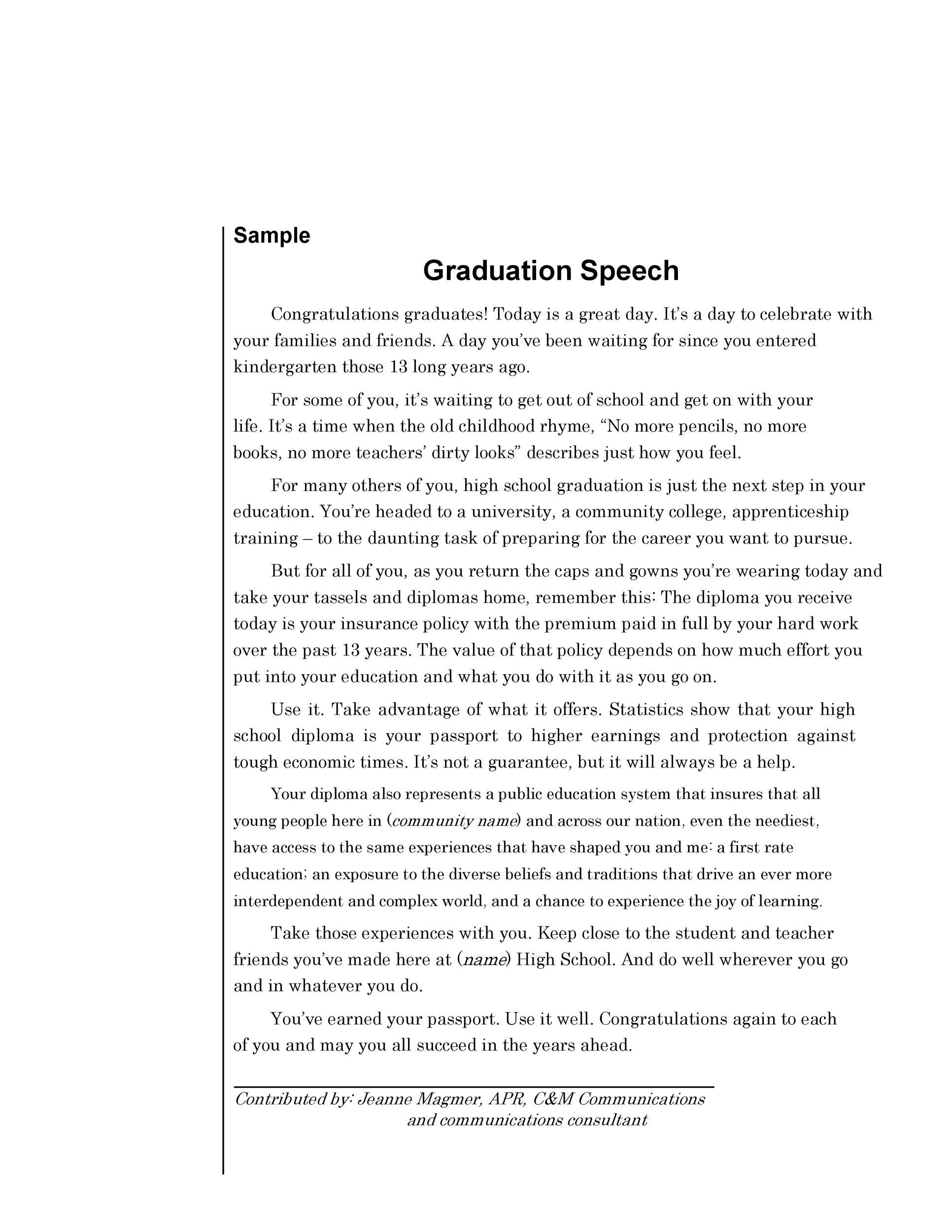
What should you write about in your graduation speech?
Most people wonder what to write for their graduation speech examples. Whether you need to compose a high school graduation speech example or a college graduation speech example, you must put a lot of careful thought and consideration into the contents of your speech.
In the past, writing a graduation speech template wasn’t that intimidating. But now, you should remember that there’s a high likelihood that the people present at the event will post your speech on social media sites such as Facebook and YouTube. This makes it imperative that you compose a speech that’s effective, interesting, and won’t end up offending anyone.
A lot of incredible speakers start their speech-writing process by creating an outline. So, if you want to come up with a great speech, you may want to start off with a graduation speech outline . Here, you include everything you want to include in your speech. From there, writing becomes easier.
Graduation Speech Outlines
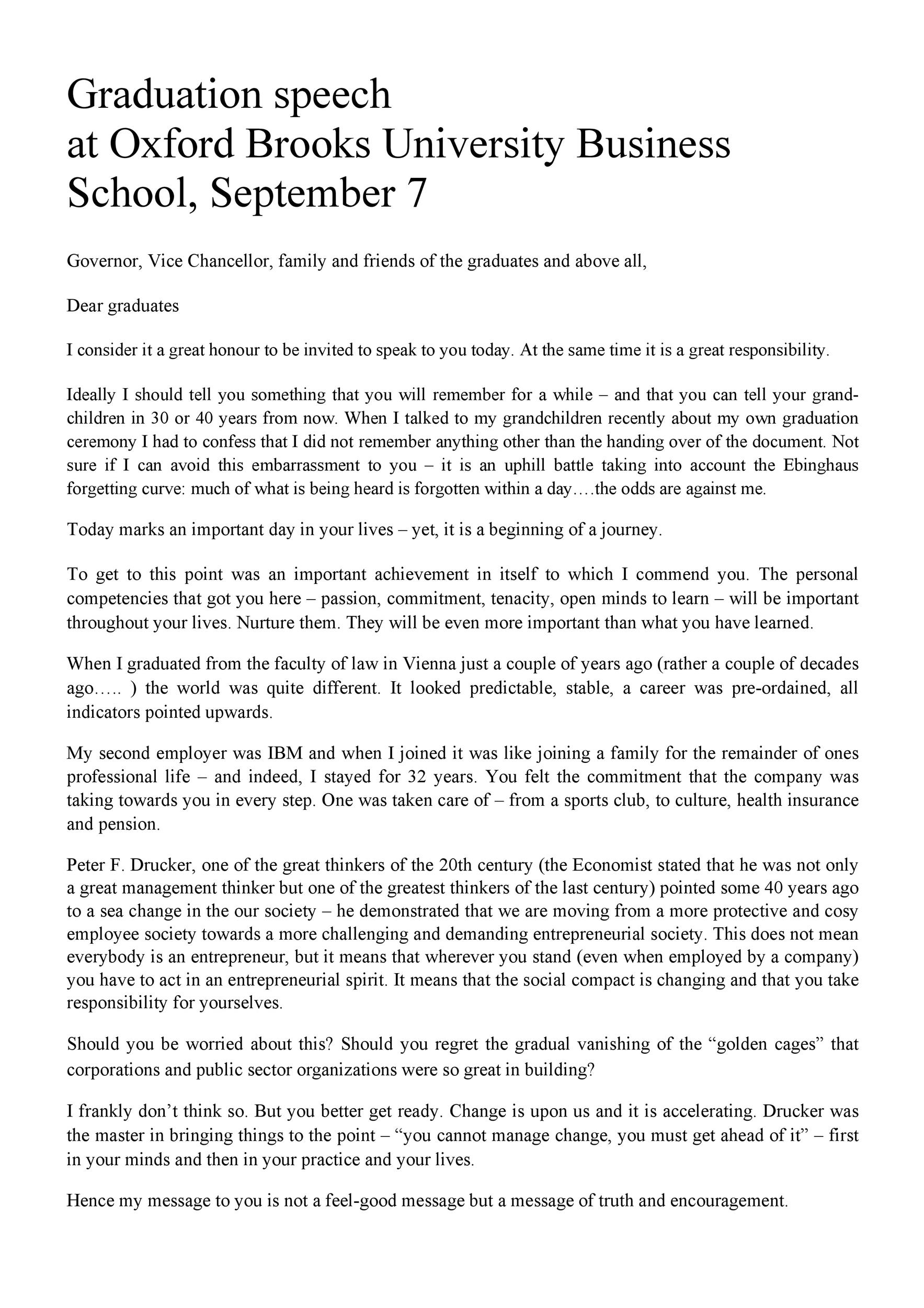
Structuring your graduation speech
When it comes to the structure of your graduation speech, you have a few options to choose from. As you create your graduation speech outline, you’re giving it a structure for you to follow when it’s time to start writing.
You may create a long or short graduation speech depending on how much you want to say and how long you want to stand in front of the graduating class. You can even create a graduation speech template using the structure of your choice. This makes it easier for you for the next time you need to come up with a speech.
If you have no idea where to start, you may go online and read high school graduation speech examples or college graduation speech examples. Use these as your reference or for your inspiration as you write your speech.
Graduation Speech Templates
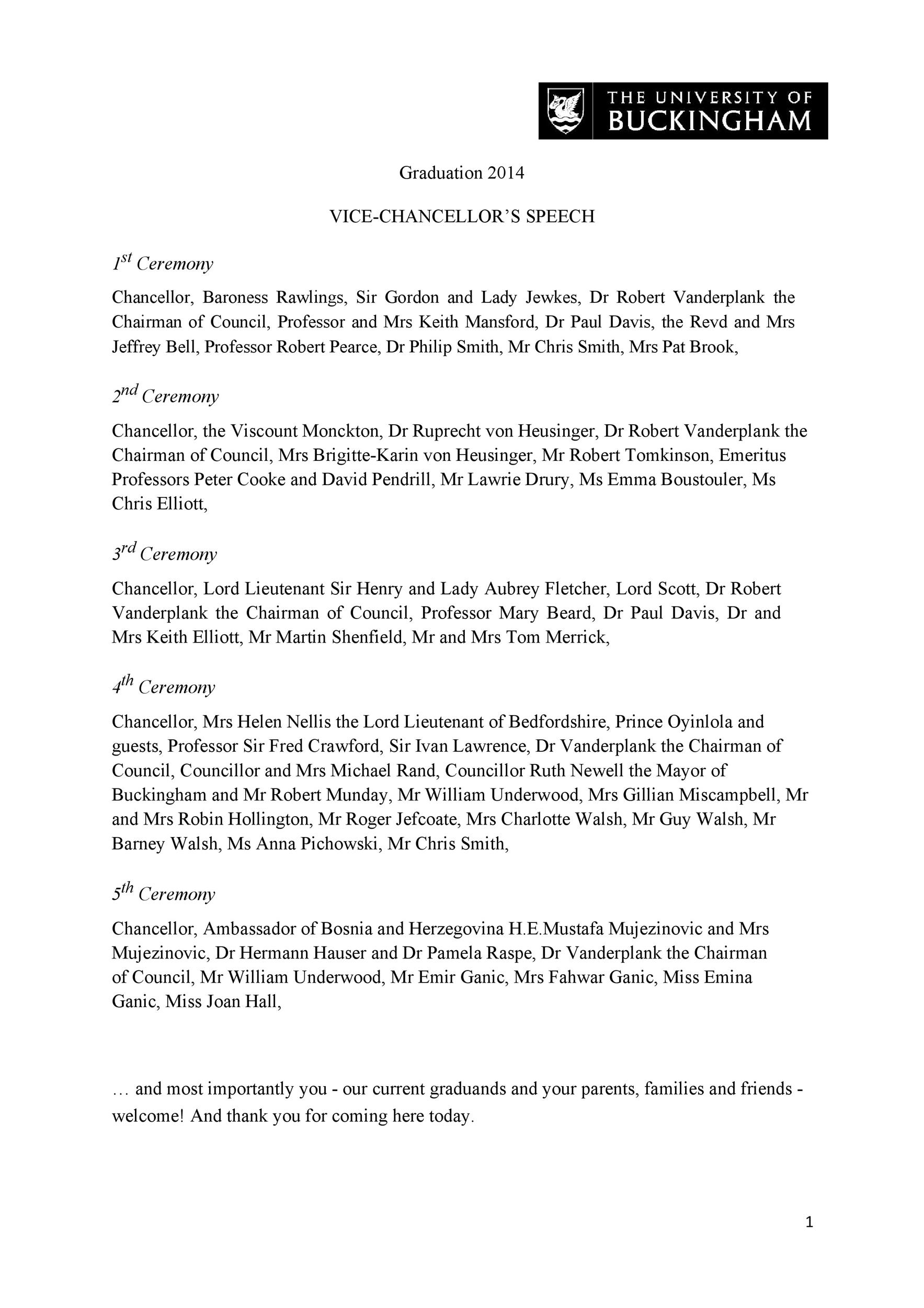
Either way, these examples will be a great help to you if it’s your first time to compose such a speech. To guide you, here are some structures to follow for your graduation speech:
- Use a few themes which you illustrate with non-fictional or personal stories For this type of speech, you can use a couple of themes which you introduce early in your speech. From reaching their dreams of finding their own place in the world, there are so many themes to choose from. Then illustrate these themes further using non-fictional examples or stories from your personal life.
- Use several themes which you illustrate with short anecdotes or personal stories For this structure, you come up with a number of themes for your audiences. But instead of sharing those themes at the start of your speech, you share short anecdotes or personal stories which illustrate those themes. Then you give helpful advice to your audience to help them in their future endeavors. However, this structure isn’t ideal for short graduation speeches. Since you’re going to use several themes, this means that your speech would be relatively long. Therefore, it’s probably a good idea to use this for a college graduation speech, not one for a high school graduation .
- Use an autobiographical narrative If you plan to use this structure for your graduation speech examples, it means that you want to open up and share more details about your life to your audience. It’s sort of like a mini-memoir wherein the audience learns a lot about the experiences you’ve had in your personal life. As you share these experiences, you also share a lot of life lessons with them. Although you don’t give advice directly at the beginning of your speech, you would incorporate these little bits of advice throughout your speech. Talk about your own experiences after graduation, how you dealt with the real world, and how you overcame different kinds of challenges.
- Use the main theme and some personal references Finally, you can also structure your speech in such a way that you’re leading up to one main theme or point. A lot of people find this structure to be extremely difficult to put together because they feel like it’s too limited. But as long as you create a graduation speech outline, following this structure won’t be that much of a challenge.
High School Graduation Speech

Tips for writing graduation speech
Whether you’re representing the graduation class or you’re asked to come and give a speech to the graduating class, you have to come up with your own graduation speech. The good news is that there are a lot of graduation speech examples which you can use as a reference.
Writing a graduation speech doesn’t have to be a difficult task. As long as you have an idea of what to write and you know what you want to say to the graduating class, the words will start flowing from your mind. But if you need some help, here are some tips to guide you:
- Brainstorming Any great speech starts with a brainstorming session. You can begin by asking yourself what you want to write in your speech. If you’re the representative of the graduating class, then think about all of the learning and experiences you’ve gained throughout your education. If they asked you to speak for the graduating class, then think about the advice you want to share to them in order to inspire them and somehow prepare them for what’s to come. Brainstorming involves a lot of thought, especially about the future. There’s nothing wrong with talking about the past and the present but since you’ll speak to a graduating class, talking about the future is much more relevant. As you think about the things to say, write everything down on a piece of paper. Later on, you can review your ideas to see which ones to keep and which ones to remove from your speech.
- Choosing a theme After your brainstorming session, you’d have a lot of ideas, stories, and advice to share to your audience. Now it’s time to begin shaping all of these into one coherent speech. To do this, you may want to think about the theme to focus on for your speech. Whether you want to choose a single theme or a collection of themes which you will link with one another, this step makes speech writing easier. Also, having a theme makes the speech more memorable and impactful to the audience. With a theme, you’ll also be able to sort through the things you’ve written down more effectively only choosing the ones which relate to your theme.
- Building the structure After you’ve identified the theme, you can start building the structure of your graduation speech. Here are some steps to help you out: Make sure that your introductory statement grabs the attention of your audience right away. In other words, get the audience “hooked” from the beginning so they will feel compelled to listen to your entire speech. Illustrate the theme you’ve chosen by telling stories. Keep in mind that the best stories always have a beginning with a challenge or obstacle, a middle where you share how you overcame it, and an end where you discussed how this experience helped you grow. For the end of your speech, tie together all of the points you’ve discussed throughout your speech. Also, make it clear how your message applies to your audience. You may also share valuable advice to your audience in the conclusion of your speech.
- Practicing your delivery Even after you’ve written your speech, the work doesn’t end there. You also have to deliver it to the graduating class. For a lot of people, this part is a lot more intimidating, especially for those who aren’t used to speaking in front of an audience. Here are some pointers for you: If you’ve created a short graduation speech, you may want to try memorizing it. This helps you focus on your delivery to make it more personable. Don’t speak too fast even when you’re feeling nervous. Try practicing in front of friends and family so you can learn how to consciously slow down your speaking rate. Once in a while, pause during the delivery of your speech. You can either pause to emphasize your point or to give the audience some time to consider what you’ve said. If you want to keep your audience engaged, make eye contact. Don’t feel stressed or stop if you make any mistake. Just continue with your speech.
- Other tips for you Don’t forget to thank everyone who helped you on your journey. If you aren’t part of the graduating class, thank the person who invited you to give the speech. Be as lively and enthusiastic as possible when delivering your speech. If it’s your first time to deliver a speech, practice again and again. Have fun with it! Feeling stressed won’t help.
College Graduation Speech
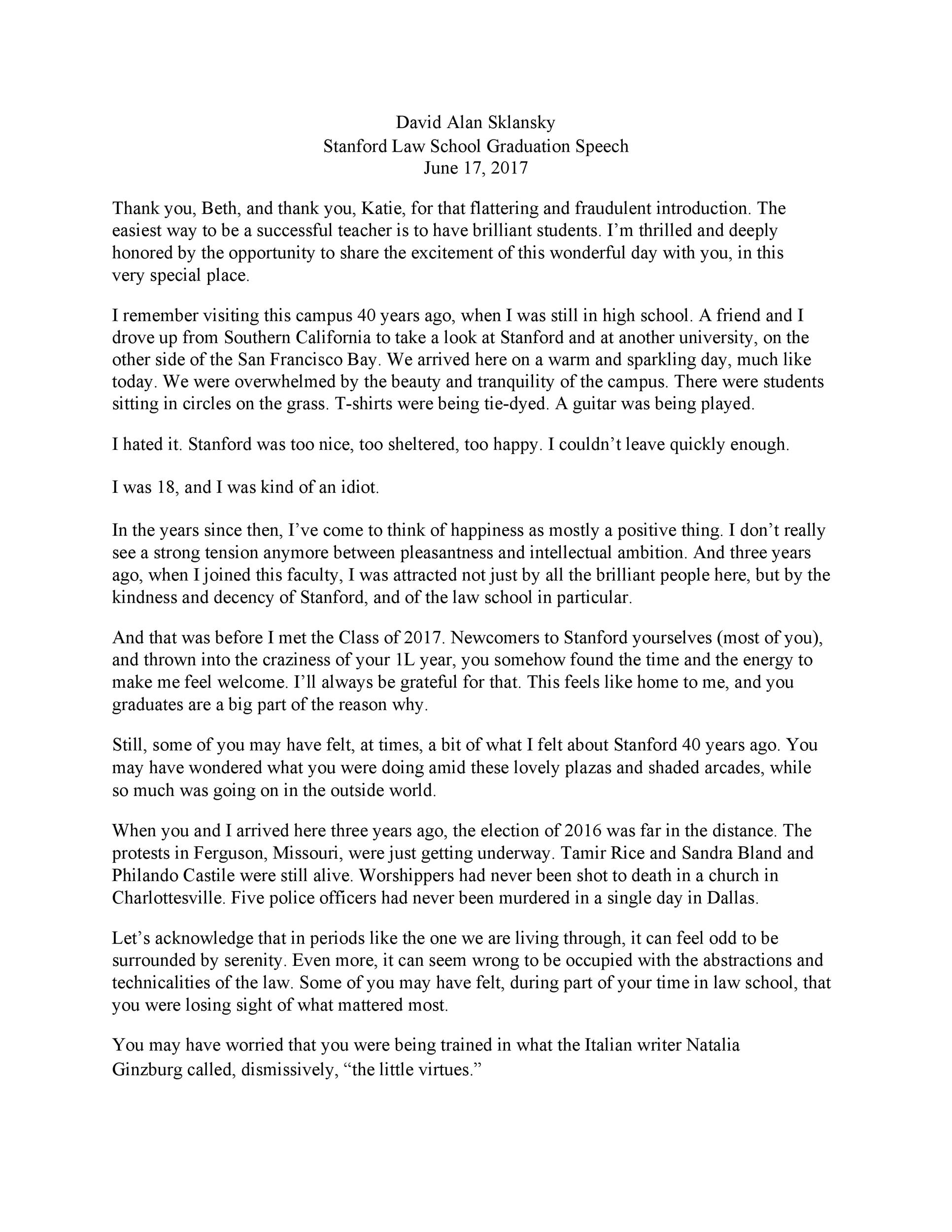
More Templates
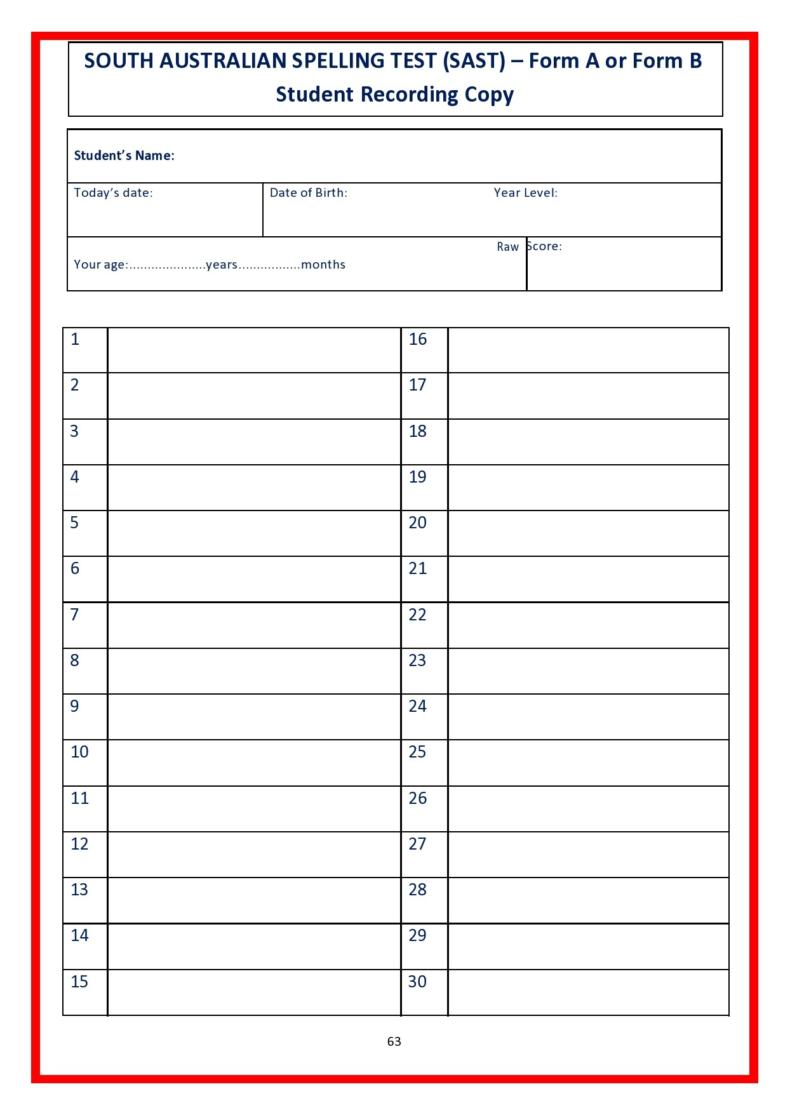
Spelling Test Templates

All About Me Templates

Frayer Model Templates

Homework Planners

Preschool Newsletter Templates

Study Plan Templates

6 tips to write a great graduation speech (with examples)
by Laura Jones
Published on November 24, 2022 / Updated on January 3, 2024
Being chosen to write a speech for a graduation ceremony is exciting, but also utterly terrifying, for many people. It’s not just your classmates in the audience, it’s parents and faculty too. And with some incredible student graduation speech examples out there (not to mention the perfection that was Steve Jobs’ speech ), there’s a lot to live up to. With that in mind, here are some tips and graduation speech examples to help you create the perfect commencement speech.
- Pick a theme
- Write an outline
- Pen a catchy introduction
- Write a thank-you paragraph
- Look back and look ahead
- End your graduation speech
Learn languages at your pace
1. pick a theme.
The overall goal of graduation speeches is to inspire and move your audience. But there are lots of ways to do this, and picking the right theme is a big part of it. Popular themes are the importance of friendship; perseverance and overcoming adversity; having big dreams and imagination; making a difference. Once you have your theme, it will be easier to choose anecdotes, quotations , and examples to put into your speech.
2. Write an outline
The next step for any commencement speech is to write an outline. Breaking it up into manageable parts not only makes it feel less overwhelming, but it helps to give your speech structure, making it easier for the audience to follow. A good speech will have the following:
- A catchy introduction
- A look back
- A look ahead
- A pithy ending
3. Pen a catchy introduction
Begin by thanking everyone for attending and for choosing you to be their speaker. Then, grab your audience’s attention from the very start with a hook. Lots of people choose to begin with a quotation that captures the theme of the whole speech.
Example: I want to begin with a quotation from Nora Ephron: “Your education is a dress rehearsal for a life that is yours to lead.”
Other ways to hook your audience are by telling a short, personal story that your classmates can relate to, or by giving a statistic or question that fits with your theme. And never shy away from humor. A speech by James Glaser at Tufts University contained only questions , one being: “Would you believe that my 5’1” sister met her 5’4” husband in a short story class?” This would be a very funny way to begin a speech about meeting special people.
4. Write a thank-you paragraph
Now your audience is paying attention, it’s time for gratitude. Thank your teachers and other staff at the school who have made a difference and tell an anecdote about someone to personalize this.
Example: “I know I speak on behalf of all of my classmates when I thank the catering staff, who have made sure we fuel our brains with more than just fries and soda during exam times.”
Now’s the time to thank the families in the audience too. You can do a personal shout-out to your mom and dad, but be inclusive and remember that your classmates will have received support from a range of people.
5. Look back and look ahead
The bulk of your speech will be spent talking about your time at the school and about how you see the future unfolding. Now is the time to focus on the theme that you chose, and to include stories about your shared experiences.
If you chose to focus on overcoming adversity , recall a challenge you faced that you know a lot of other people did too. Share how a lesson you learned at school will help you after you leave, and remind everyone that you have learned much more than what was on the syllabus.
Example: As Rita Moreno said, “The day you graduate, you do not arrive. This is not the end. This is the beginning for you. To graduate is to change gradually.” I know we’ve all changed so much already and we will continue to do so.
6. End your graduation speech
End with some advice and a call to action. Lots of people end with a quotation, and this can be from someone famous or from you.
Example:
- George Saunders said, “Do all the other things, the ambitious things—travel, get rich, get famous, innovate, lead, fall in love, make and lose fortunes…but as you do, to the extent that you can, err in the direction of kindness.”
- C.S. Lewis told us that “There are far, far better things ahead than any we leave behind.” So let’s go find them.
Writing a great graduation speech
Beginning with a theme and an outline helps focus your speech, which should make it easier for you to write with clarity and to find the right stories and quotations to use. Telling personal stories that everyone can relate to, sprinkled with humor, is a wonderful way to keep people engaged throughout your speech. And, ending with a bang in the form of an amazing quotation will help inspire your audience and leave them feeling upbeat.

Laura Jones
Laura is a freelance writer and was an ESL teacher for eight years. She was born in the UK and has lived in Australia and Poland, where she writes blogs for Lingoda about everything from grammar to dating English speakers. She’s definitely better at the first one. She loves travelling and that’s the other major topic that she writes on. Laura likes pilates and cycling, but when she’s feeling lazy she can be found curled up watching Netflix. She’s currently learning Polish, and her battle with that mystifying language has given her huge empathy for anyone struggling to learn English. Find out more about her work in her portfolio .

Jun 05, 2024
Lingoda’s career stories: Meet Urte, Team Lead of Lingoda Teams
Today, we’re interviewing Urte Sinisi, who joined Lingoda in June 2022, inspired by the company’s mission and multifaceted approach. Intrigued...

May 08, 2024
Lingoda’s career stories: Meet Andreas, our People Engagement Specialist
Have you ever wondered what it’s like to work at a company where your passion for languages fuels your career?...

Apr 18, 2024
Reflexive pronouns and how to use them
Are you familiar with words like “myself” and “ourselves”? These are reflexive pronouns, which we use to reflect the action...
Level up your language skills with Lingoda. Take our placement test for free and get started.

Home › Inspirational Graduation Speeches
Inspirational Graduation Speeches

Some of the links in this post may be affiliate links. See our disclosure for more info.
Do you have a graduating son or daughter? A high school or college graduation is a major milestone in life that should not be ignored. The graduation ceremony celebrates hard work and encourages students to move into the world to achieve great things. This hopeful message is further cemented through an inspirational graduation speech.
As you celebrate graduation day and wish your student good luck, consider the following commencement advice you can share as well as inspirational quotes for a happy graduation.
Here are the best graduation speeches and inspirational message graduation quotes to inspire you and change your life.
Page Contents
1. Barack Obama – Howard University, 2016

You have to go through life with more than just passion for change; you need a strategy. I’ll repeat that. I want you to have passion, but you have to have a strategy. Not just awareness but action. Not just hashtags, but votes. Barack Obama
During his graduation message, Barack Obama spoke with hope. He urged the graduating students to be hardworking yet pragmatic as they sought justice, equality, and freedom. Howard University is one of the nation’s most distinguished and historically Black universities.
In 2020, Barack Obama also shared a graduation message to the Class of 2020 as part of Graduate Together: America Honors the High School Class of 2020 . These students had to learn to overcome obstacles and challenges that classes before them had not had to deal with due to the pandemic.
The disappointments of missing a live graduation, those will pass pretty quick…What remains true is that your graduation marks your passage into adulthood—the time when you begin to take charge of your own life. It’s when you get to decide what’s important to you: the kind of career you want to pursue. Who you want to build a family with. The values you want to live by. And given the current state of the world, that may be kind of scary. Barack Obama
Obama goes on to offer hope and support as graduating students set out to navigate a very new landscape and shape a new world.
2. David Foster Wallace – Kenyon Graduation Speech, 2005
There are these two young fish swimming along, and they happen to meet an older fish swimming the other way, who nods at them and says, “Morning, boys. How’s the water?” And the two young fish swim on for a bit, and then eventually, one of them looks over at the other and goes, “What the hell is water? David Foster Wallace
In this commencement address, Wallace reminds us that we often forget, or take for granted, the most obvious things around us. He acknowledges it’s difficult to stay aware of what’s happening in the world, especially when you’re too busy dealing with the monologue inside your head.
That’s what a college education is about, according to him. It’s learning how to think and exercising some degree of control over your thoughts so you can choose what to pay attention to.
Our thoughts affect our realities, and the ability to choose how you “construct meaning from experience” will determine the lenses from which you see the world and how you react in return.
3. Natalie Portman – Harvard Graduation Speech 2015

Sometimes your insecurities and your inexperience may lead you, too, to embrace other people’s expectations, standards, or values. But you can harness that inexperience to carve out your own path, one that is free of the burden of knowing how things are supposed to be, a path that is defined by its own particular set of reasons . Natalie Portman
Natalie Portman majored in psychology at Harvard University because she believed it would help her acting. She graduated in 2003. In her commencement speech at the 2015 graduation ceremony, she spoke of her own self-doubt and gave an inspiring, funny , and wisdom-filled speech for the graduating class.
Portman said even though she was a successful student and went on to find success as an actress, she still struggled with her own worth but eventually learned to set her own goals.
4. Ellen DeGeneres – Tulane University, 2009

Never follow anyone else’s path, unless you’re in the woods and you’re lost and you see a path and by all means you should follow that. Don’t give advice, it will come back and bite you in the ass. Don’t take anyone’s advice. So my advice to you is to be true to yourself and everything will be fine. Ellen Degeneres
This is one of the funniest graduation speeches ever! All humor aside, this speech shows why it’s better to be true to yourself instead of trying desperately to be a second-rate version of someone else.
For years, Ellen thought being bisexual might prevent her from being a successful stand-up comedian, but it’s just not the case. Ellen proved that you could be successful, whoever you are, if you worked hard and learned from your past experiences— even one as sad as the death of a loved one.
5. Charlie Munger – University of California Law School, 2007

*Skip to 4:08 for the actual speech
You’re not going to get very far in life based on what you already know. You’re going to advance in life by what you’re going to learn after you leave here. Charlie Munger
Education doesn’t stop after you graduate from college. It doesn’t stop after you finish your MBA or PhD either. Munger says, “Wisdom acquisition is a moral duty. It’s not just something you do to advance in life.”
It’s a moral duty because it’s only through continuous learning that we can add to the vast knowledge of man kind. If we stopped learning, progress in all industries—computers, finance, engineering, biology, stops as well.
6. Michelle Obama – Eastern Kentucky University, 2013

If you’re a Democrat, spend some time talking to a Republican. And if you’re a Republican, have a chat with a Democrat. Maybe you’ll find some common ground, maybe you won’t. But if you honestly engage with an open mind and an open heart, I guarantee you’ll learn something. And goodness knows we need more of that, because we know what happens when we only talk to people who think like we do — we just get more stuck in our ways, more divided, and it gets harder to come together for a common purpose. Michelle Obama
As far as inspirational speeches go, Michelle Obama’s speech is very actionable. Her advice is simple (not easy), talk to each other with an open mind.
Different religion, race, political stand, it doesn’t matter. We can all learn from one another.
7. Jim Carrey – Maharashi University of Management, 2014

This is one of my favorite motivational speeches because Jim Carrey is such a good example of his message.
So many of us choose our path out of fear disguised as practicality. My father could have been a great comedian, but he didn’t believe that that was possible for him, and so he made a conservative choice. Instead, he got a safe job as an account. Jim Carrey
Carrey’s father lost his accounting job when he was 12, and it was then he realized that failure is inevitable , whether you’re doing what you want or not. If that’s the case, you might as well take a stab at doing something you love.
8. J.K Rowling – Harvard Commencement Address, 2008

I was set free, because my greatest fear had been realized, and I was still alive, and I still had a daughter whom I adored, and I had an old typewriter and a big idea. J.K. Rowling
This is probably one of the most inspirational videos for writers and creatives everywhere.
Rowling was suffering from depression when he wrote the Harry Potter books. But through grit and patience with herself, she was able to complete the first Harry Potter Manuscript and, stay motivated to continue even when feeling down. Thanks to her drive and imagination, the world has Harry Potter !
9. Bono – University of Pennsylvania, 2004

In case you don’t know him, Bono is the lead singer of the famous band U2. Of course, being the rock star he is, he leads his speech by saying, “My name is Bono, and I am a rock star.”
In his speech, he urges graduates to carefully consider their big idea, in saying:
What are you willing to spend your moral capital, your intellectual capital, your cash, (and) your sweat equity in pursuing outside of the walls of the University of Pennsylvania? The world is more malleable than you think, and it’s waiting for you to hammer it into shape. Bono
Being a rock star, I thought Bono would talk about the perils of fame, the road to stardom or something to that effect. But instead, he talked about big ideas and changing the world.
10. Amy Poehler – Harvard University, 2011

Life is like a heist that requires good drivers, an explosives expert, a hot girl who doubles as a master of disguise, and this is a hard and fast rule. If the Rock shows up, they’re on to you . Amy Poehler
During her commencement speech at Harvard University in 2011, Amy Poehler expressed her surprise at the invitation to do so. She delivered a speech with jokes, advice, and insight as she looked out at the graduates.
She told them to head out into the world with love, light, joy, and laughter. Finishing off her speech in true Amy Poehler fashion, she also says, “please don’t forget to tip your waitresses.”
11. Meryl Streep – Barnard College, 2010

This is your time, and it feels normal to you, but really there is no normal. There’s only change, and resistance to it and then more change . Meryl Streep
Meryl Streep is an actress most famous for Sophie’s Choice , The Devil Wears Prada , and Mamma Mia . She was asked to deliver the commencement speech to Barnard College in 2010. Her speech was dripping with extreme personality, honesty, and bluntness.
Streep shared her own personal stories and emphasized the importance of empathy. The audience was all women, so the speech was directed at them, but she shared many graduation messages that applied to everyone.
12. Kerry Washington – George Washington University, 2013

You and you alone are the only person who can live the life that writes the story you were meant to tell . Kerry Washington
Kerry Washington is an actress, producer, and director. In 2018, she was named the eighth highest-paid television actress and has won several awards, including the President’s Award.
In her commencement speech at George Washington University in 2013, she urged graduates to go beyond their comfort zones and live their own stories.
How to Create Your Own Inspirational Graduation Speech
Do you need to write your own inspirational speech or curate the perfect graduation message? Here are a few tips on how to do just that, so you can inspire others like the commencement speeches above.
Start With a Quote
Start with a relevant quote. This sets the overall tone of your speech and grabs your audience’s attention. A good example of this is a quote by David Brinkley, “A successful man is one who can lay a firm foundation with the bricks others have thrown at him.”
Provide Scenarios
Now that you have drawn in the audience, present a what-if scenario to encourage the audience to continue following your thought process.
You can also provide a scenario encouraging the audience to put themselves directly into it. Suggest that they imagine doing something and ask what they would do if it doesn’t go as planned.
If you are giving a graduation message, ask where they see themselves years down the road or what they picture success as. You can then offer advice and insight based on your own experience.
Ask Questions
You should also ask questions, whether they are literal or rhetorical. When you present a question to someone, the person intuitively answers it, keeping them engaged with what you have to say.
Pause for Silence
When giving an inspirational speech, it also helps to pause for a few seconds after important points. This pause allows the audience to react to what you have to say and settle down before you continue with your next statement. The pause is also a good way to draw attention to what you want to say.
What Makes an Inspirational Graduation Speech?
The best graduation speech should have a very uplifting message that leads with education and wisdom. The graduation speech should focus on the graduates’ achievements and accomplishments. It should highlight the sacrifices that may have been made.
When writing a graduation or inspirational speech, ensure a strong theme or message is conveyed to keep your audience’s focus and attention.
Do you remember the speaker on your graduation day? What pearls of wisdom did he or she share?
Related Reading : Don’t forget what you worked so hard on in school! Check out our 150 Education Quotes for Teachers and Students , too. These gems are good for any graduation card when offering congratulations.
Natalie Seale
3 thoughts on “Inspirational Graduation Speeches”
Am really inspired by these brief messages,indeed education has no boundary; therefore, I say to you,” education is immeasurable, regardless of what disciplines or background we find ourselves.
These are very inspiring. My favorite is from J.K. Rowling. Thanks for sharing
Actually Very Inspiring ……thanks for sharing
Leave a Comment Cancel reply
Save my name, email, and website in this browser for the next time I comment.

Leadership Speech
Leadership speech generator.

Leadership is a character a lot of us wants yet only a few can master. Being a leader entails great responsibility. Speech writing could be a challenge for some but for a leader, it is more of a necessity. It requires both the mind and the spirit to come up with a powerful speech.
A leadership speech could be likened to a keynote speech because it stirs emotions among the audience. However, a leadership is more of an encouragement message. It should be filled with words of unity, camaraderie, and trust. Let us discuss in great detail what a leadership speech is.
Short Leadership Speech
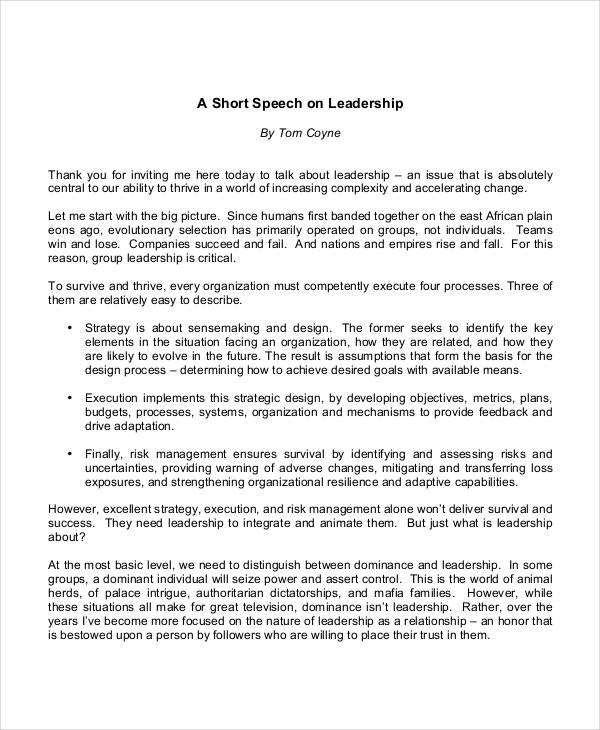
Size: 66 KB
School Speech
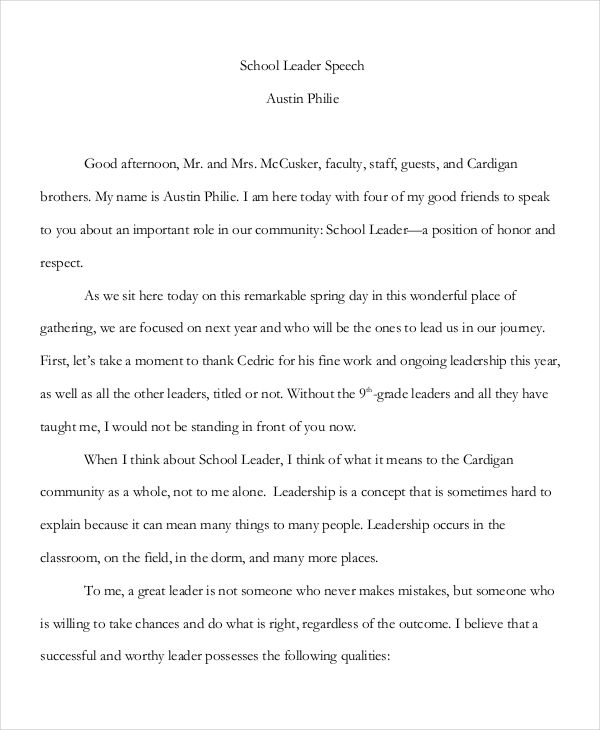
Size: 55 KB
What Is a Leadership Speech?
A leadership speech is a particular kind of speech that is used to deliver a strong message with the purpose of influencing others and providing inspiration when necessary. It is a composition designed with the objective to motivational speech others, lead them in the right direction, and drive them towards a common goal.
Although most speeches require to use proper language to deliver a message, a leadership speech takes more than that. The language to be used should be easily understood by the audience yet able to convey a strong and powerful effect.
Leadership Conference
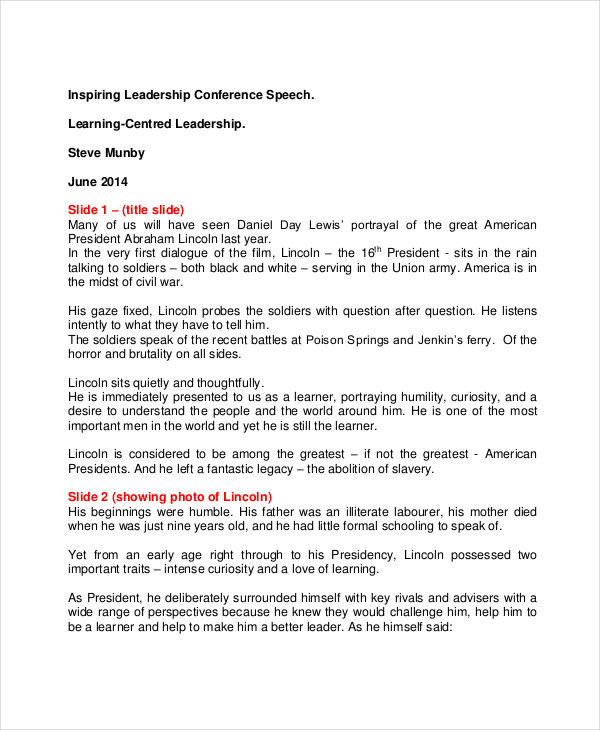
Size: 392 KB
School Captain Speech

Size: 543 KB
How to Give a Leadership Speech
In order to give an inspiring leadership speech, you need to have the spirit and heart of a true leader. Here are some tips for you.
1. Be Confident.
Confidence is the first thing you need to practice before delivering a leadership speech in pdf . If you do not sound confident, your audience will see as weak and an inefficient leader.
2. Show Enthusiasm.
If you happen to read some welcome speech examples, you will know that they have a common denominator, i.e., it is filled with energy and emotion. You should be able to convey the right emotion to your audience.
3. Use Body Language.
You cannot just stand in front o everybody and read your lines. You have to use hand gestures and other parts of your body to send your message.
Leadership Elevator
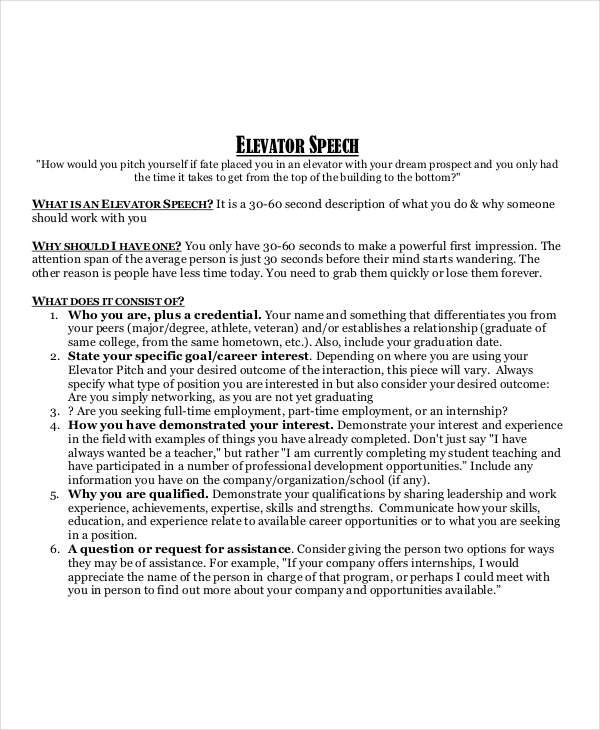
Size: 113 KB
High School Speech
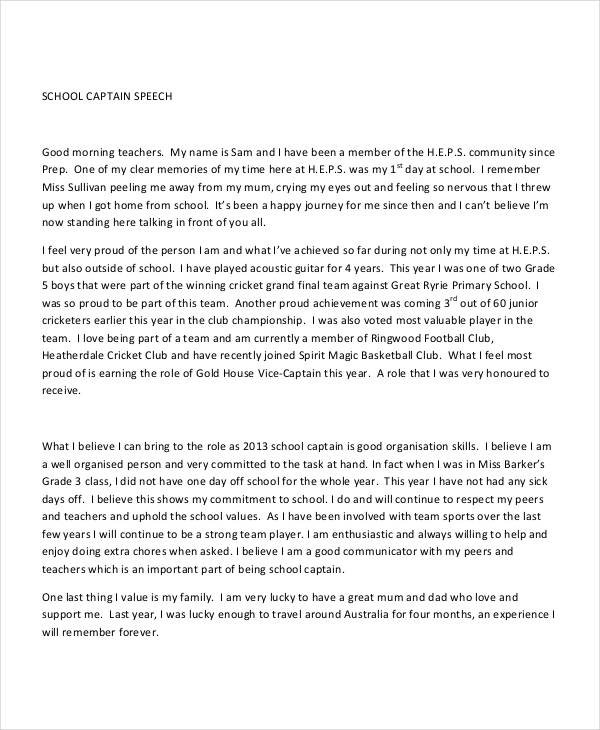
Size: 94 KB
Leadership Motivational
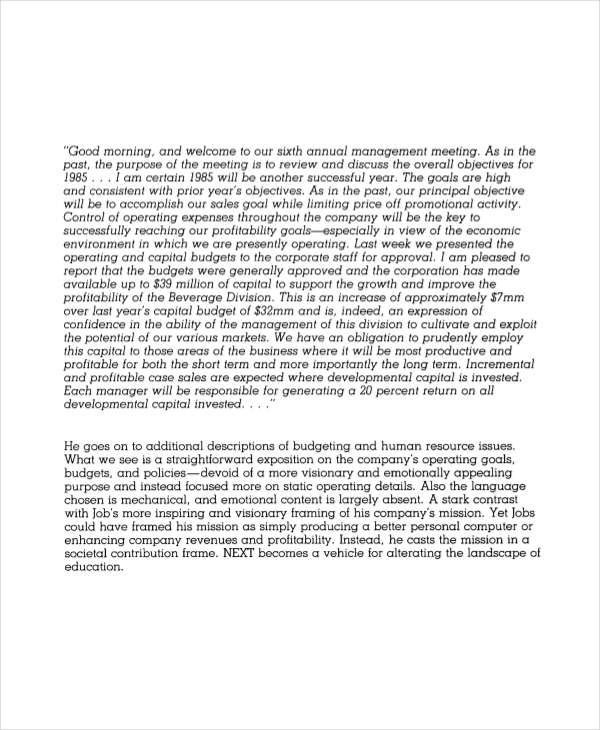
Tips for an Effective Leadership Speech
When you write your speech , make sure to use proper language and style. Here are a few tips for you.
1. Start with a Strong Opening.
This is always an essential key in any speech. You have to start strong. Remember that you have to catch your audience’s attention.
2. Create an Outline.
When presenting speech make sure to prioritize the important ones. In addition to that, organize your thoughts for a clearer message.
3. Develop a Connection.
Always bear in mind that in order for your message to be understood, you need to have a connection with the crowd. You may also see appreciation speech examples & samples.
High School Graduation Speech
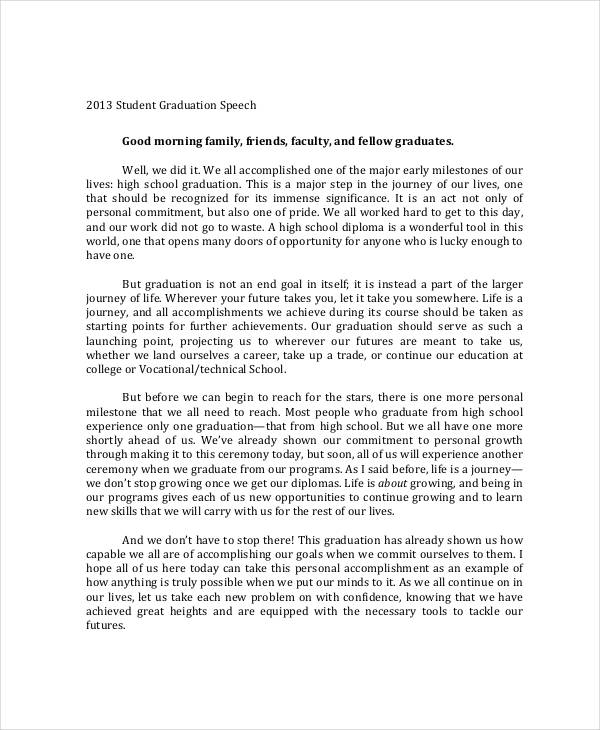
Size: 75 KB
Effective Leadership Speech
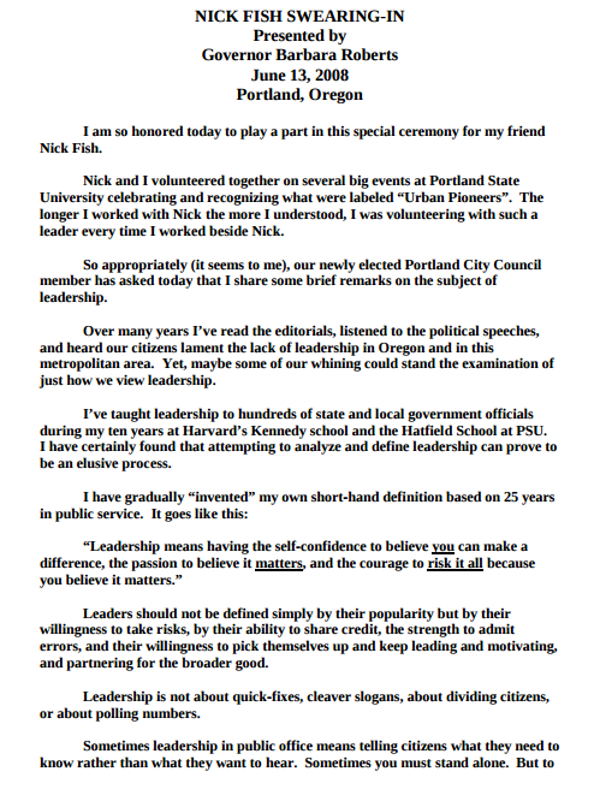
Size: 10 KB
International Women’s Day Leadership Speech
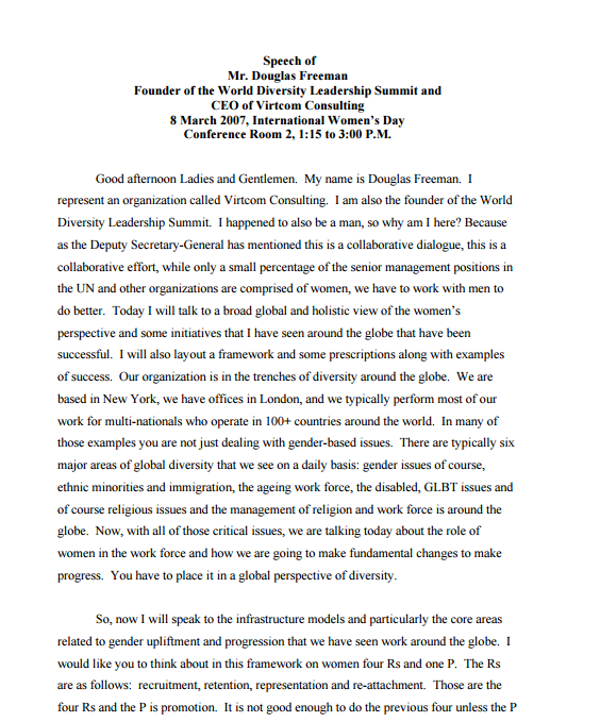
Size: 70 KB
Leader’s Breakfast Speech
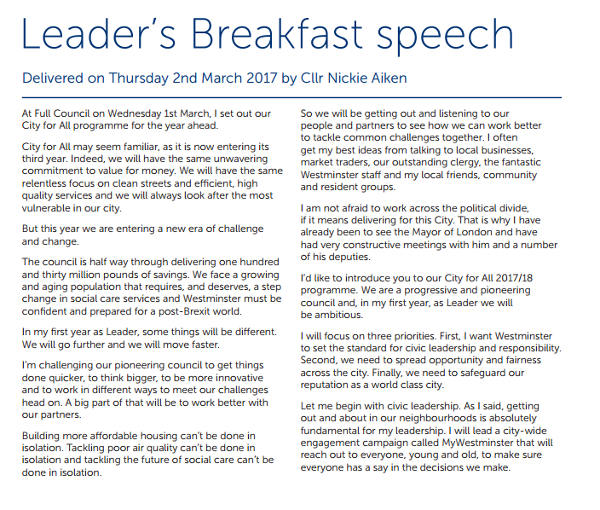
Size: 71 KB
Benefits of a Leadership Speech
Delivering speeches has always been proven an effective way to send out important message. It can change the course of history. Graduation speech examples have always united the spirit of students although the celebration means they are separating their ways.
A leadership speech word in the same way acts as an instrument to ignite emotions and encourage others. People who do not have a voice in the society consider it an opportunity to be heard and acknowledge specially if the leader understands their sentiments. It is through the leader’s speech that the rest of the members’ thoughts are brought out in the open.
Text prompt
- Instructive
- Professional
Create a leadership speech for a corporate team-building event
2. Help me write a leadership speech for a school leadership program
- Share full article
Advertisement
Supported by
Who’d Want to Give a Commencement Speech Anymore?
Executive communications experts say the gig is becoming a harder sell for business leaders.

By Sarah Kessler , Lauren Hirsch and Michael J. de la Merced
Tim Cook has delivered at least seven commencement addresses since becoming the chief executive of Apple. The superstar Taylor Swift, whose concerts have been credited with lifting local economies, addressed New York University’s graduation ceremony in 2022. Bill Gates, Oprah Winfrey, Jamie Dimon — they’ve all given graduation speeches more than once.
They’re obviously not doing it for the money (and typically there isn’t any). Instead, speakers have long seen graduation ceremonies as offering something increasingly rare: a stage where a large group of people gather to hear speakers impart wisdom, advice or whatever else they want to talk about.
The appeal of being a commencement speaker, however, seems to be waning.
Just three Fortune 50 chief executives appear to be commencement speakers this year, as colleges have faced campus protests over the war in Gaza, student arrests and wealthy alumni threatening to break ties with their alma maters over antisemitism.
“The idea of C.E.O.s going out aggressively and speaking anywhere near this environment on campuses, it just doesn’t seem like the moment for them to be doing that,” said David Murray, the executive director of the Professional Speechwriters Association.
C.E.O.s are tired of talking. At a recent meeting of executive speechwriters, Murray said one takeaway stood out. As one presenter put it, “ Less is more, in ’24.”
Murray highlighted the sentiment in the Professional Speechwriters Association’s May newsletter: “Folks will increasingly keep their leaders out of the spotlight,” he wrote, describing the current moment as one in which “even formerly anodyne messages encouraging employees to vote” sound partisan to some.
We are having trouble retrieving the article content.
Please enable JavaScript in your browser settings.
Thank you for your patience while we verify access. If you are in Reader mode please exit and log into your Times account, or subscribe for all of The Times.
Thank you for your patience while we verify access.
Already a subscriber? Log in .
Want all of The Times? Subscribe .
Ms. Rachel’s incredible NYU graduation speech will give you all the feels
Try not to cry while listening to ms. rachel’s emotional graduation speech at nyu’s steinhardt school., may 30, 2024, what’s next for russia, what comes next after texas school shooting, what's next for abortion rights in america, the new battle for voting rights, how we can build a clean and renewable future, the fight for kyiv, examining extremism in the military, gun violence: an american epidemic, border crisis: what’s happening at the us-mexico border, remembering george floyd: a year of protest, the source of covid-19: what we know, how did the gamestop stock spike on wall street happen, why are people hesitant to trust a covid-19 vaccine, how climate change and forest management make wildfires harder to contain, disparity in police response: black lives matter protests and capitol riot, 2020 in review: a year unlike any other, examined: how putin keeps power, why don’t the electoral college and popular vote always match up, us crosses 250,000 coronavirus deaths, 2nd impeachment trial: what this could mean for trump, presidential transition of power: examined, how donald trump spent his last days as president, how joe biden's inauguration will be different from previous years, belarus’ ongoing protests: examined, trump challenges the vote and takes legal action, 2020’s dnc and rnc are different than any before, what is happening with the usps, voting in 2020 during covid-19, disinformation in 2020, abc news specials on, impact x nightline: on the brink, impact x nightline: unboxing shein, the lady bird diaries, impact x nightline: it's britney, impact x nightline: natalee holloway -- a killer confesses, impact x nightline: who shot tupac, impact x nightline, power trip: those who seek power and those who chase them, the murders before the marathon, the ivana trump story: the first wife, mormon no more, leave no trace: a hidden history of the boy scouts, keeper of the ashes: the oklahoma girl scout murders, the orphans of covid: america's hidden toll, superstar: patrick swayze, the kardashians -- an abc news special, 24 months that changed the world, have you seen this man.

IMAGES
VIDEO
COMMENTS
Conclusion. Master your moment with a graduation speech that turns heads and warms hearts. Remember the power of gratitude and connect with your audience through stories, those shared adventures that bind you to your classmates. Don't be afraid to add a few jokes and quotes to your speech either, as well as personal growth stories to inspire.
Step 4: Create an Outline. Organize your ideas into a clear and coherent outline for your speech. Start with an introduction that grabs the audience's attention and introduces your theme. Then, outline the main points you want to cover in the body of the speech.
Here are the four tips they all contain: 1. Dream big. "I think it is often easier to make progress on mega-ambitious dreams. I know that sounds completely nuts. But, since no one else is crazy enough to do it, you have little competition. There are so few people this crazy that I feel like I know them all by first name.
Thank the principal/dean for the invitation to speak. Next, thank the administration. Then, thank the faculty. Thank the parents and distinguished alumni. And, finally, thank the class of [year]. Many speakers will add in a little humor here by poking fun at the typical words used in this thanks.
Tip #1: Read Inspirational Quotes. Reading inspirational quotes is a great way to start brainstorming graduation speech ideas. The best quotes can pack a whole speech into only a sentence or two. Here are a few examples to get the fire of inspiration started: "The two most important days in your life are the day you are born and the day you ...
Put feeling into your voice. Don't ramble on in a monotone voice for eight minutes or you'll put everyone to sleep. Get excited about your speech, and let your excitement bleed into your voice. Mix up the volume, pitch, and speed of your voice for an even better delivery. [12] 7. Be confident, not cocky.
My sisters weren't allowed to; the girls before me weren't allowed to.". 19. Funny Graduation Speech. This graduation speech by the senior class president is humorous and engaging. The class president reminisces with plenty of jokes in a speech full of fun memories and just the right amount of inspiration.
The best high school graduation speeches aren't long and boring since the ceremonies already take hours. Aim for an address that doesn't exceed 10 minutes. Keep your audience's attention and save some for other people's speeches. Your graduation speech should only be around 500 to 600 words. You have to read it slowly and articulate the ...
Emphasize the importance of shared experiences and friendships. Looking Forward. Discuss hopes and dreams for the exciting possibilities ahead. Conclusion. Wrap up with a memorable and inspiring closing message. All these elements make a strong and memorable speech and help make your graduation successful.
Step 4: Rehearse. Rehearse frequently and out loud so that you internalize your message. Understand why you are speaking the words you have chosen and repeat them in rehearsal until you feel the essence of your message in your gut. If you go blank during your speech, don't panic.
Trying to write a graduation speech that both inspires and keeps people listening can be a little tough. Learn how to write a great one with this outline! ... Whether you're excited or terrified to give the speech, this is not the kind of opportunity you should wing. Get started with our graduation speech outline and a few writing tips to ...
It covers all aspects of writing a graduation speech comprehensively with an example using the Same guide. Get Graduation KNOW TO DO. Discover the power of focused productivity with the our new ... The fact is you are not the first person to give the graduation speech and most likely will not be the last person ever. Hundreds before you have ...
15. Chimamanda Ngozi Adichie: Wellesley College, 2015. "As you graduate, as you deal with your excitement and your doubts today, I urge you to try and create the world you want to live in ...
If you've been chosen to deliver a graduation speech, follow these steps to ensure you write a speech that inspires your fellow graduates and audience.
Crafting a memorable graduation speech involves using storytelling to leave a lasting impression on the graduates. Storytelling has a unique ability to captivate an audience, evoke emotions, and make key messages more relatable. By sharing personal anecdotes or inspiring stories of individuals who have achieved great things, public speakers can ...
A good speech, like a good story, has a beginning, middle, and an end. Plan your speech to grab people's attention in the beginning, keep their attention through the middle, and tie it together in the end. Focus the body of your speech on telling a story, offering some insight, or sharing lessons learned. At the end, summarize your main points ...
Most graduation ceremonies have multiple time constraints to consider. The school may give your child a suggested speech length. Most college and university commencement speeches last around 5-10 minutes, so high school speeches are typically shorter. You can guide your honoree to keep it concise and focus on delivering a few key points ...
50 Top Graduation Speech Ideas (& Examples) Try to search online and you'll find a lot of graduation speech examples. If you're in charge of giving a speech during this important event, you have the choice of whether to compose a long or short graduation speech. As long as you're able to convey your message, the length isn't that relevant.
6 tips to write a great graduation speech (with examples) by Laura Jones Published on November 24, 2022 / Updated on January 3, 2024
The audience was all women, so the speech was directed at them, but she shared many graduation messages that applied to everyone. 12. Kerry Washington - George Washington University, 2013. You and you alone are the only person who can live the life that writes the story you were meant to tell. Kerry Washington.
A Student Graduation Speech is a special talk given by a student during a graduation ceremony. It's a moment where the student shares their experiences, celebrates achievements, and gives thanks to teachers, family, and friends. The speech often includes memories from school, lessons learned, and hopes for the future. ... Give Everyone Some ...
Grace teaches you how to give a graduation speech.SUBSCRIBE YOU BEAUTIFUL MUFFINS! MAKE SURE TO SUBSCRIBE TO MYMUSIC!http://www.youtube.com/mymusicshowhttp:/...
EXETER — Exeter High School valedictorian Neiming Wu didn't want to give the usual graduation speech to his classmates. Instead, he shared the three ways to fail, citing the old saying ...
How to Give a Leadership Speech. In order to give an inspiring leadership speech, you need to have the spirit and heart of a true leader. Here are some tips for you. 1. Be Confident. Confidence is the first thing you need to practice before delivering a leadership speech in pdf. If you do not sound confident, your audience will see as weak and ...
Some executives prefer chats to speeches. The chief executive of Microsoft, Satya Nadella, accepted an honorary Ph.D. at Georgia Tech this year, but did not give a commencement speech.
Federer couldn't help but give an actual tennis tip to end his speech, too, as he demonstrated how to better your forehand. This sparked some laughter in the crowd. Check out Federer's full speech ...
Ms. Rachel's incredible NYU graduation speech will give you all the feels Try not to cry while listening to Ms. Rachel's emotional graduation speech at NYU's Steinhardt School. May 30, 2024.
Maya could no longer give her speech or receive the state college scholarship awarded to students first in their class. Feeling embarrassed and isolated, she skipped graduation, which is why her ...